#i feel like we as a society have not discussed this scene enough or like at all actually
Text
The world is so hostile to tweens.....
Like we joke about how our schools growing up would ban the latest toy trends, but that reality genuinely horrific when you think about it. Like maybe 1% of the bans were based on safety, but the rest cited reasoning like
-"kids were bartering for collectibles" (kids learning about economics and product value)
-"kids were wearing them and the colors were too flashy" (kids experimenting with self expression and fashion)
-"kids were playing with them during lunch and recess instead of using our rusted safety hazard playground" (kids utilizing their free time to do what helps *them* unwind).
Play areas specifically geared towards children and especially towards teens are constantly being shut down. "Oh kids today are always on their phones!" Maybe because
-there are barely any arcades left and even less arcades that aren't adult-oriented,
-public pools and gyms are underfunded and shut down,
-"no loitering" laws prevent kids and teens from just hanging out,
-movie theatres only play the latest films and ticket prices are only rising,
-parks and playgrounds are either neglected or replaced with gear only directed at toddlers and unsuitable for anyone older
-genuine children's and young teen media is being phased out in favour of media directed only at very small children or older teens and adults.
-suburbs and even cities are becoming more and more hostile to pedestrians, it's just not safe for kids to walk to or ride their bikes to their friends' houses or other play destinations
Children's agency is hardly ever respected. Kids between the ages of 9-13 are either treated as babies or as full-grown adults, with no in-between. When they ask to be given more independence, they are either scoffed at or given more responsibilities than are reasonable for a child their age.
This is even evident in the fashion scene.
Clothing stores and brands like Justice and Gap are either closing or rebranding to either exclusively adult clothing or young children's clothes, with no middle ground for tweens. Tweens have to choose between clothes designed for adults that are too large and/or too mature for their age and bodies, or more clothes they feel are far too childish. For tween girls especially it's either a frilly pinafore dress with pigtails or a woman's size dress with cleavage. No wonder tween girls these days dress like they're older, it's because their other option is little girl clothes and they don't want to feel childish.
And then when tweens go to school, the books they want to read aren't available because they cover "mature" topics (read: oh no two people kissed and they weren't straight or oh no menstruation was mentioned or oh no a religion other than Christianity is depicted), so kids are left with books for way below their reading level. No wonder kids today are struggling with literacy, it's because they can't exercise and expand their reading skills with age-appropriate books. Readers need to be challenged with new words and concepts in order to grow in their skills, only letting tween read Dr. Seuss and nursery rhymes doesn't let them learn.
Discussions about substance use, reproduction, and sexuality aren't taught at an age-appropriate level in school or even by children's parents, so they either grow up ignorant and more vulnerable to abuse, or they seek out information elsewhere that is delivered in a less-than-age-appropriate manner. It shouldn't be a coin-toss between "I didn't know what sex was until I was 18 and in college" or "my first exposure to sex as a tween was through porn" or "I didn't know what sex was so I didn't know I was being sexually abused as a kid."
Tweenhood is already such a volatile and confusing time for kids, their bodies are changing and they're transitioning from elementary to middle to high school. It's hard enough for them in this stage, but it's made worse by how society devalues and fails them.
We talk about the disappearance of teenagehood, and maybe that's gonna happen in the future, but the erasure of tweenhood is happing in real time, and it's having and going to have major consequences for next generation's adults.
#leftie shit#i guess#ageism#social issues#tweenhood#the disappearance of tweenhood#current events#relevant issues
12K notes
·
View notes
Text
Welcome back to the Ineffable lyric discussion (can I hear a wahoo)
In honor of the announcement of season 3 of our beloved Good Omens, I find it completely necessary for us to discuss one of the many songs on Aziraphale and Crowley's angelic playlist that made me scream my bloody head off. One of those songs is the one and only The Book of Love by Peter Gabriel. While I UNDERSTAND this song may have just been chosen to spell out SEASON THREE, I think it goes much deeper than that because of all of the parallels it draws to Aziraphale and Crowley. And ultimately, what I think is going to happen in terms of their relationship when they finally sort their shit out. So beware if you haven't watched season 2 of Good Omens because we're about to do a fucking DEEP DIVE into this.
First, the title of the Book of Love feels almost like a call to this looming threat to the Book of Life that was consistently used in series 2. The entire season, Crowley and Aziraphale have to work oh so carefully because with the Book of Life being confirmed, they know that either of them could get the other erased, and whether they want to admit it or not, losing the other is their biggest fear. We've seen this when Crowley believed Aziraphale to be dead in Series 1 when he couldn't feel Aziraphale's presence anymore since he got incorporated. When Aziraphale isn't there, Crowley is a mess. Likewise, we saw how both reacted during the ineffable divorce scene in series 2. Crowley is full-on begging Aziraphale to stay, and Aziraphale has finally admitted that he needs Crowley and full-on mouths for Crowley not to leave him. The Book of Life inherently, from how Neil set it up, feels threatening. The Book of Love, on the other hand, raises an entirely other reaction. Throughout the series, as corny as it sounds, love has been what grounds our protagonists. It is the love of Tadfeild and his friends that keeps Adam from kickstarting the end of the world; it's what keeps him from rejecting his father, the literal devil. It is the love of the earth, of humanity and all its strange creations, and for each other that keeps Aziraphale and Crowley attempting to prevent the end of the world when it could be so much easier to just accept the fate of it all. Love is the key theme that grounds our protagonists, that makes them tick. Love is safe; love is, at times, painful but overall kind. So when we see this title on their playlist, listed amongst heartwrenching tales of grieving a relationship, you could have had, and of loss, it brings a sense of salvation and safety. The Book of Love, unlike the Book of Life, is not a threat- it's a sanctuary for Aziraphale and Crowley.
Now, diving into the lyrics.
"The book of love is long and boring
No one can lift the damn thing
It's full of charts and facts, and figures, and instructions for dancing
But I
I love it when you read to me.
And you
You can read me anything"
The first couple of verses inherently feel like Aziraphale and Crowley's original view on this notion of love. As two supernatural entities who aren't bound by human emotion or logic, love may seem superficial and downright silly at times. The courting procedures that different societies have taken on throughout the centuries and the songs and dances that come along with it may all seem like a big waste. The book of love is a manifestation of love itself, and originally, it seems unappetizing to our protagonists. That is until they refind each other, and love goes from this thing that humans feel and jump through hoops for to this tidal wave of emotions. Love felt silly and unrealistic before, but with each other, they are willing and excited to explore it, even if it comes with things that feel inherently silly.
Also, these verses draw some cute parallels to headcanons and features of cannons. If you've been involved in the Good Omens fandom long enough, you've probably stumbled across the idea that Crowley asks Aziraphale to read to him for a multitude of different reasons. Some people say it's because his eyes aren't meant to read, one of the many punishments that came with him being cast down from grace, or maybe it's just because he finds Aziraphale's voice comforting. Additionally, the line about instructions for dancing is just so heartwarming when we look at the ball scene from this past season and Aziraphale's daydreams of a romance worthy of a Jane Austin novel.
"The book of love is long and boring
And written very long ago
It's full of flowers and heart-shaped boxes
Adn things we're all too young to know
but I
I love it when you give me things
and you
You ought to give me wedding rings"
I'm sure we've all heard this idea that you'll understand love when you get older, but even when you get older, it never seems to make sense. This idea that love is too old for any of us to truly understand, and that humbles us but in the best way possible. There is no point in trying to figure out what exactly love is because you could spend thousands of years feeling it and watching it happen all around you and still not know exactly what it is besides this all-encompassing feeling. And that is exactly the perspective of Aziraphale and Crowley. They have seen countless examples of love, true, unwavering love, and they have felt it for each other. And yet they themselves cannot begin to fathom what love, true unconditional love, is exactly. These two supernatural, ethereal/occult beings are humbled by the very concept of love like humans are- and that love is drawn from each other.
And then there is this notion of giving, which pairs so well with Crowley's primary love language, acts of service and gift giving. If the first chorus was Crowley talking about how he loves it when Aziraphale reads to him and takes care of him, then this is Aziraphale talking about how Crowley displays his love. And this final notion of asking for that final commitment, one of the key ways humans express their love for each other, is just amazing. Because in a way, Aziraphale moving to make this commitment, to fully be on their side in this way, is the resolution we have been wanting since the beginning. For Aziraphale to finally feel safe enough to let go and finally let himself settle to where he finally belongs, on his side with Crowley.
#good omens#michael sheen#neil gaiman#david tennant#go2 spoilers#good omens season 2#aziraphale#go spoilers#crowley#good omens spoilers#good omens playlist#good omens 3#good omens season 3 confirmed#oh my god its happening#everybody stay calm#I went overboard again#this is my roman empire#and i will not apologize#neil gaiman you did this to me#and now michael sheen will somehow find this#because he is literally EVERYWHERE#hi michael#ily
414 notes
·
View notes
Text
Thinking about the crazy love triangle situation in Blue Eye Samurai and debating heavily with myself on how I'd like to see it conclude. And yeah this discussion can be thought of purely as shipping, headcanons, and fandom fun. But when analysing the show and engaging with it in a more in-depth, almost-literary level, it's impossible to dismiss who Mizu's potential love interests are and how different endgame romances would affect her character arc and the overall story and themes.
So in this post I'd like to look at the love triangle a bit more closely, and speculate on where the story will take this.
DISCLAIMER: It is my personal interpretation of the text that Mizu is non-binary—I use this as an umbrella term denoting any gender that does not adhere to the binary restrictions, norms, and expectations of what it means to be either a man or woman in a particular society; it's not just an androgynous "third gender" that exclusively uses they/them pronouns. Thus, while I personally believe Mizu is not strictly a cis woman, she does still identify with womanhood, despite definitely feeling a level of detachment from it due to living as a man for so long. With that being said, I will be using she/her pronouns for Mizu in this post, but please note that this is purely personal preference. Everyone is free to interpret the text the way they like. That's the fun of fiction. Now, without further ado, let's proceed.
Okay so, thinking about the pairings on a purely surface level, and even before i got into the show, I was pinning my hopes on some lesbianism going on between Mizu and Akemi, and the show does hint at this; in Ep1, during their first encounter in Kyoto, there is the famous slow-mo shot of their eyes meeting, Mizu's lips slightly parted as she is unable to tear her gaze away from Akemi, while sweet string music plays in the background. This is clear romantic framing, and a marker of attraction. If Mizu was a cishet man, there would be no question that this is a potential love interest.
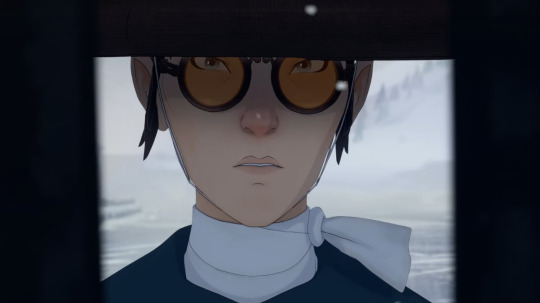
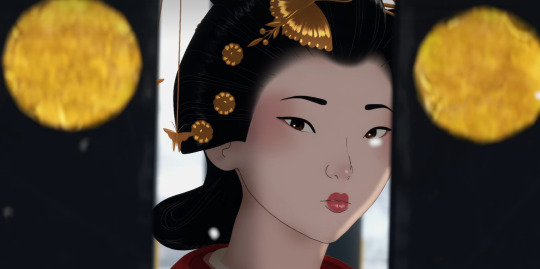
But then, in the same episode, we meet Taigen, who is introduced to us firstly from hearing Akemi's father describe him as "a fierce and undefeated young samurai", the "best swordsman in the best school" and "a fisherman's son from Kohama [...] whose rise reminds [him] of [his] own."
In the next scene, we meet him in person as Akemi's fiance, and he seems sweet enough. He even gives her sweets! In exchange, Akemi gives him gold, and he feels a bit ashamed that he doesn't have anything better to offer her. But Akemi accepts him and his gift wholeheartedly and flirts with him a little, which makes him smile kinda shyly.
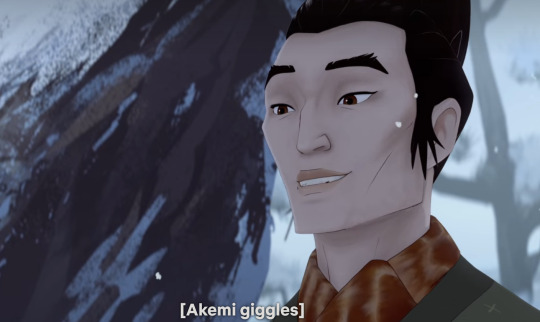
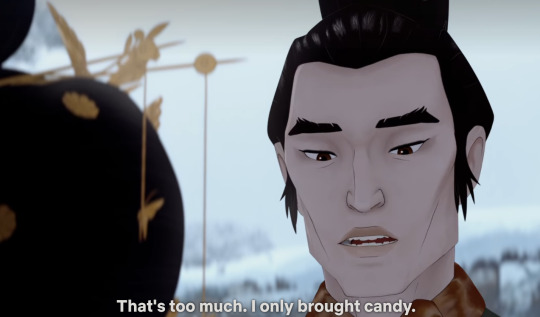
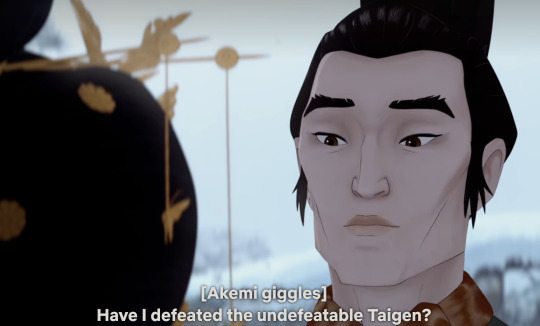
When Akemi confirms their engagement, Taigen is in disbelief because he has no status or noble background, but Akemi reassures him.
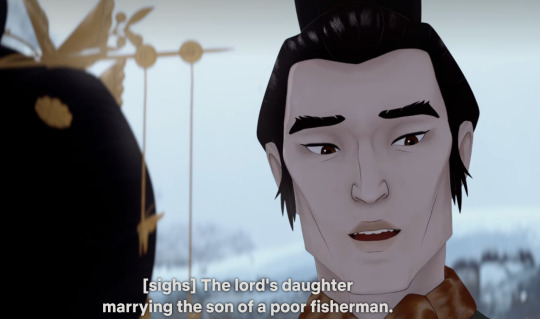
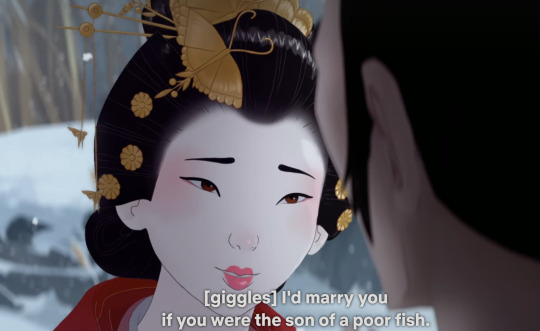
So from these first few scenes, we're introduced to Taigen as an honourable and strong samurai, but also as a man who is sweet and gentle with the woman he is about to marry, as well as aware of his own inferiority when compared to Akemi's high station.
Our view of him then changes as his true self is revealed: he is an arrogant and smug bastard among his peers, but more importantly, he is the terrible bully from Mizu's childhood.
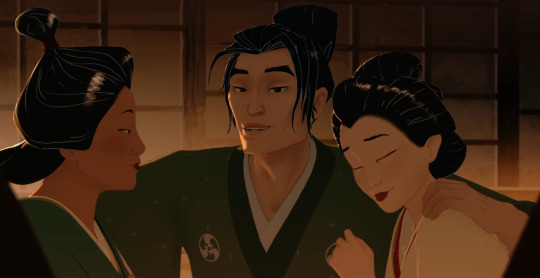
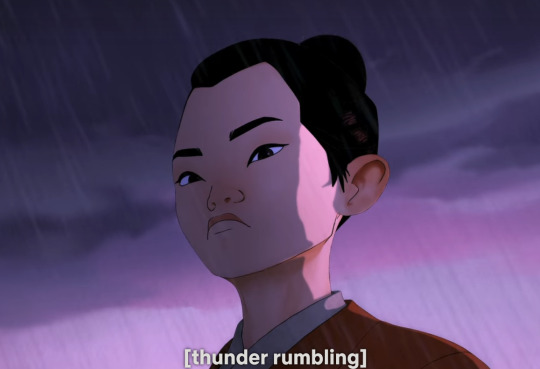
And it is this side of Taigen--pompous jerk and unrepentant xenophobic bully--that we continue to see as the show goes on, and it's safe to say that this is his real self, sans any pretense of humility and modesty. Around anyone who isn't an outright superior in terms of class and power (ie. Akemi's father, the shogun), Taigen never hesitates to assert his own authority and "greatness."

But as the show goes on, he gets caught by Heiji Shindo's men, and then tortured. And that's when we see, okay, turns out he's not that bad. He's honourable; "honour" is not just meaningless and superficial pedantry for him, but an internalised, guiding principle.
He was a cruel asshat throughout Mizu's childhood, but in a prejudiced and xenophobic society, he was just playing by the rules. As a child, he knew he was at the bottom of society, but when met with someone even lower ranked than him (Mizu), he can project all those prejudices and insecurities onto someone else. This way of thinking--"if you can't beat 'em, join em"--is what allowed him to climb up the ranks despite being some dirt poor kid from an abusive household*.
*Well, that combined with his cismale privilege of course, because this would not be an option for a woman in similar circumstances.
Thus, his upholding of honour also exemplifies how Taigen embodies the ideals and rules of his society. His insistence on duelling Mizu is another more blatant example of this. He doesn't want revenge like Mizu does. He wants to be accepted by society, within the bounds that society has placed, and that means that his only two options following his defeat at the Shindo dojo were to either chase Mizu down and get his damn duel, or kill himself for his humiliating defeat.
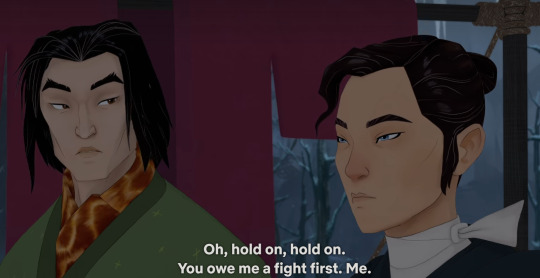
Now! Moving on from Taigen, let's go back to the other end of this little love triangle: Akemi.
Mizu and Akemi only properly meet in Ep4. During their first meeting, when Akemi tries to poison Mizu in Madame Kaji's brothel, she compliments Mizu's eyes, calling them "beautiful."
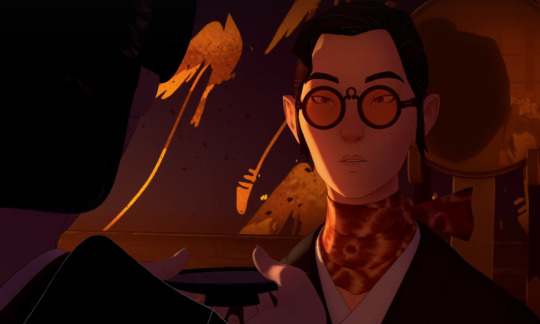
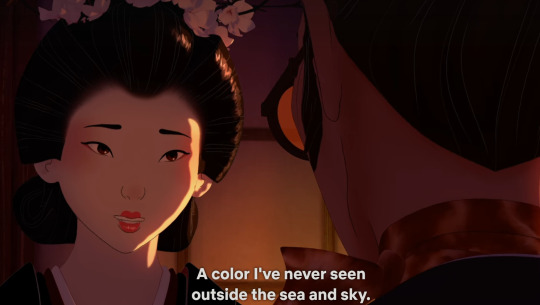
This seems to genuinely take mizu off-guard for a second before she coolly plays along. We know that Mizu recognises Akemi from the get-go, and thus sees through Akemi's ploy from a mile away. It's also safe to assume she'd expected false flattery, because Mizu understands full well that this tactic is how women get what they want: by using their 'feminine wiles' and playing up their naivety and innocence. But even so, it's interesting that Mizu actually seems surprised by Akemi's compliment.
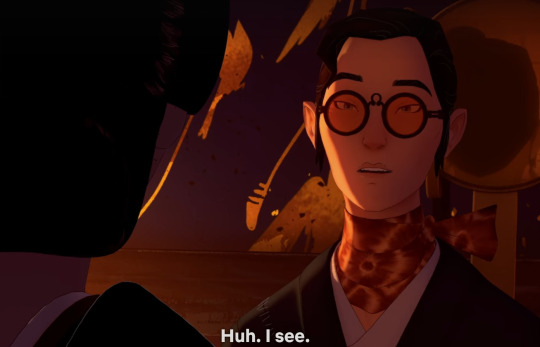
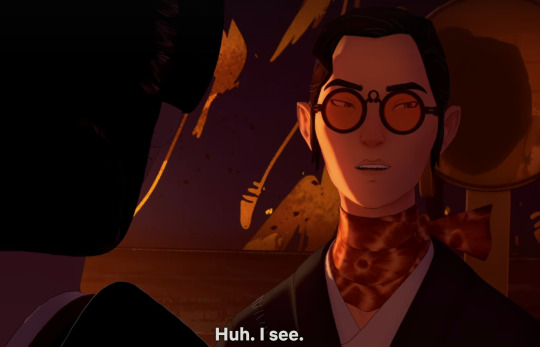
Then, after Mizu subtly taunts Akemi by lying about Taigen's death, she and Akemi have a bit of a scuffle, and then we get to Mizu saying this:
"Women in our world don't have a single good option. Except you, like some magical forest creature. You could have anything you want, but then you beg to eat trash."
(no screenshot because it's quite a long line but you get it)
Here we see Mizu's opinions on the marginalisation of (mostly poor and under-privileged) women stated outright, and underlying her words is also resentment. Because even though she and Akemi have shared experiences of female oppression, Mizu, unlike Akemi, was also poor, from a rural village, and is a racial minority. Mizu is triply oppressed, while Akemi only faces one primary form of oppression, and to someone as embittered by the world as Mizu is, to see Akemi "beg to eat trash" is a slap in the face, practically tone-deaf to the other injustices around her--injustices which Akemi has not shown much, or any, acknowledgement for at this point.
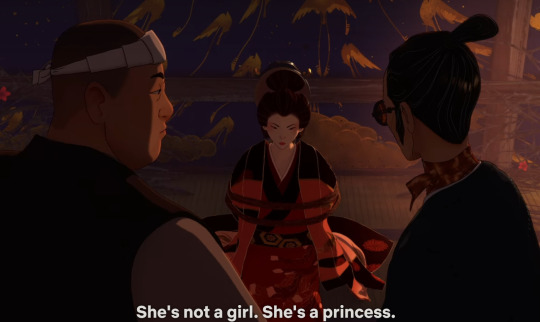
Then, after this scene, Mizu kills Kinuyo, and this unsettles her to a degree we've never seen from her before. She is visibly distraught, and the entire sequence hammers the theme of this episode (and arguably, a large portion of the show) into our heads: women in this world suffer. And even though Mizu is well aware of this fact, to commit this act is so visceral that is shakes her to her core, and it's what ultimately leads to the ambush of the Thousand Fangs.

But before the ambush, Mizu and Akemi talk a little again, and during this time Akemi taunts Mizu some more.
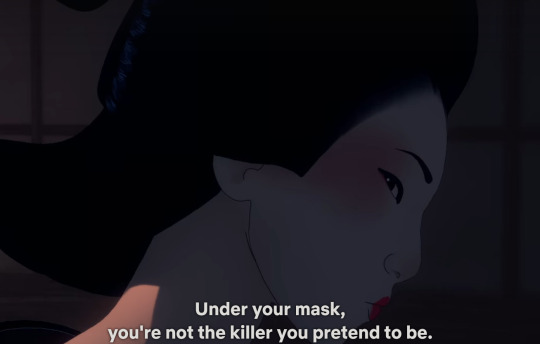
Right now, Mizu is exhausted to the point where (I believe) she even downs some sake, despite not usually drinking. Thus, worn down, she cuts Akemi's ropes and tells her, "Just go." Akemi recovers from her initial fear of Mizu's blade and taunts her some more, accurately seeing through Mizu's facade of coldness, recognising the raw anger there, and says this:
"I thought you had to be something special. Your face isn't even so scary. You're just... angry."
At this, Mizu is amused and compares Akemi to Taigen ("I see why he likes you. You're just like Taigen when we were children. A fucking brat.")
The reveal that Mizu and Taigen knew each other in childhood surprises Akemi, but before either of them can say more, everything goes to shit.
That's when we get to Ep5. This episode focuses primarily on Mizu, the central piece of this love triangle, and does the most out of all the episodes to shed some light on her character and goals, fleshing her out to be more than just the vengeful, highly proficient samurai we've seen thus far (symbolised by The Ronin), but also a person who is capable of love, domesticity and gentleness (symbolised by The Bride). But in the end, Mizu rejects both these ideals, instead becoming an Onryo, who is neither guided by pride/honour, nor love.
By 'reincarnating' into an Onryo, Mizu is able to win the day and save the women in the brothel. However, as she has now fully embraced her status as an Onryo, and is exhausted physically, mentally, and emotionally, she lets the Tokunobu clansmen take Akemi away while Akemi's screams echo in her ear.
Mizu says this choice is for Akemi's own good, that Akemi's better off; because Mizu is jaded and weary, and cannot afford the luxury of idealism, and thus must always be strictly practical and realistic. So of course that's why, in her view, yes, Akemi should not be wasting her time in a brothel where women are exploited and abused, nor should Akemi be so naive to think that her marriage with Taigen is even still possible. However, regardless of Mizu's views, it is not for her to decide, because though Akemi is privileged in some sense, she is still trapped and voiceless, and deserves the right to choose her own destiny.
But as it happens, in the end, though Akemi did not choose who she gets to marry, she DOES get to choose her next move when Edo burns down.
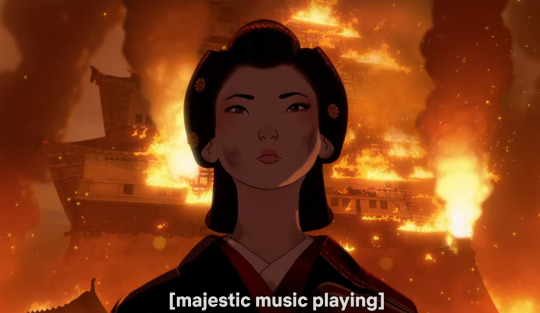
"I want to be great."
This one line is the key to her entire arc, which is only just beginning. We see she quickly has acquired the affection and good graces of the shogun's son after their wedding night and consummation, and with Madame Kaji and the girls now serving her, Akemi will only grow to become a prominent political player.
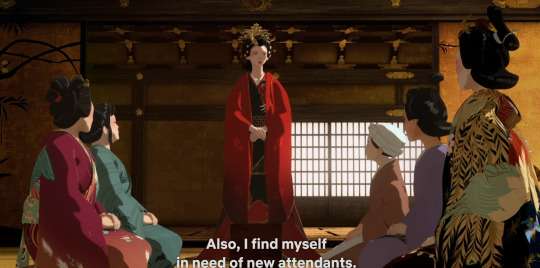
NOW, only after analysing the characters as they are within this season, only can we speculate how their arcs will continue as the show progresses.
First and foremost, I will reassert the popular opinion that Mizu and Akemi are foils. The climax (pun intended) of Ep7 illustrates this as it parallels the turning points in both Mizu's and Akemi's arcs:
Mizu melts the steel of all her loves and shames, the people she's collected: the broken blade wielded by both Chiaki and Taigen, Akemi's knife, Ringo's bell, Master Eiji's tongs - this symbolises her beginning to accept herself, and in doing so, also accepting the help of others;
Akemi consummates her marriage with Takayoshi Itoh, gains his affection, and cements her position as a woman in the shogun's palace - this symbolises her taking charge of her situation, no longer playing the damsel, but using her position to her advantage, empowering both herself and the underprivileged women around her.
These are thus two directly contrasting, diverging journeys:
Mizu's arc moves inward (yin). It is an internal path of self-love and self-discovery, focused on finding peace and tranquility inside herself, and this involves allowing herself to let others into her life, opening herself up to friendship and empathy once more.
Akemi's arc moves outward (yang), it is an external path of growth, transforming from a naive, caged princess to a powerful woman and a force to be reckoned with.
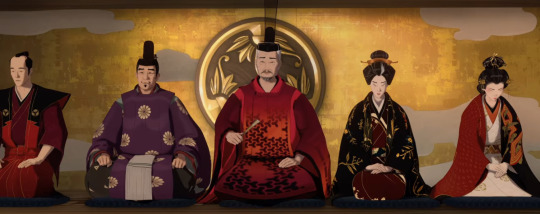
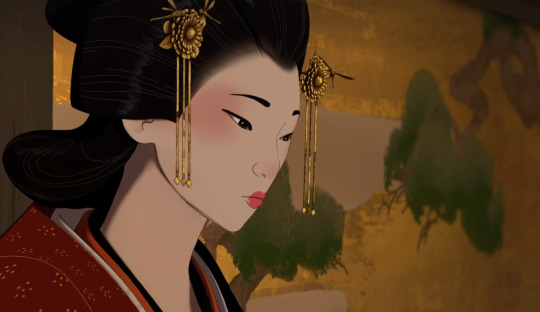
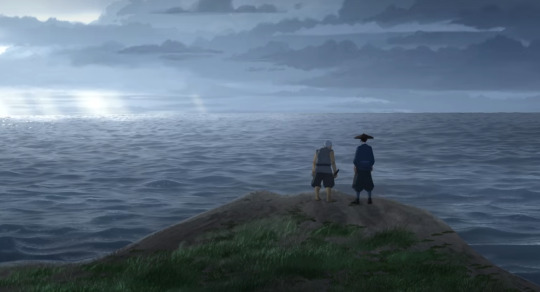
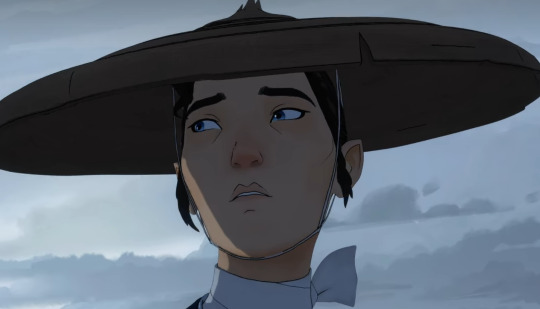
Akemi is always dressed in red, even her eyes are a bit of a reddish-brown rather than brown-black like most other characters, and in her penultimate scene she stands against a backdrop of flames. She is fire: quick-tempered, passionate, full of energy. Red is powerful, authoritative, and in eastern cultures, it is associated with prosperity.
Mizu is blue: her eyes, her sword, her clothes. She is also named after water; it's where she goes to recover, reflect and meditate. Water is fluid like a brook weaving around a stone in its path, always changing and adapting, it is graceful, it is beautiful and ruthless, tranquil yet swift.
Thus, in the future, I expect we will see plenty of political manoeuvring and intrigue in Akemi's plotline, where she fully embraces control of her life, and begins to take action to help others as well, realising that her own oppression is just one piece in a much larger picture. Her main conflict is with society.
In direct contrast, Mizu's main conflict is with herself. She must realise that her desire for vengeance is a projection of her own deep-rooted self-hatred. Her arc must move towards unpacking her feelings and trauma so she can be at peace with herself and allow space for love in her heart. Because as we saw in Ep5, Mizu had come extremely close to achieving peace and joy, as she had not only loved Mikio, but also had briefly believed that Mikio had loved her (and accepted her for who she is) as well.
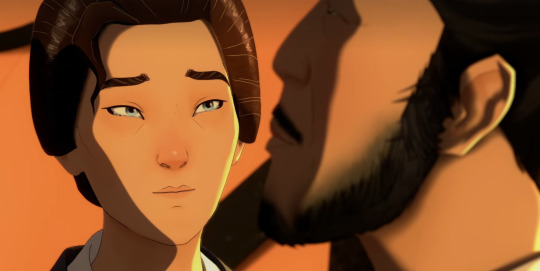
Thus, assuming the story is not planned as a tragedy, Mizu will likely end up getting her vengeance, but it will not satisfy her, because it is not what she needs. What she needs is to let go of the Onryo within her and to reconcile both The Ronin and The Bride within herself, as she is both a fighter and a lover, but not a monster.
(Edit: I recommend checking out this post by @stylographic-blue-rhapsody for a much clearer analysis about Mizu'a symbolism as Ronin, Bride and Onryo!)
And now that we've mostly covered each of the characters individually, we can finally get to the main point of this post: the love triangle.
--
Let's talk about Option A: Akemi.
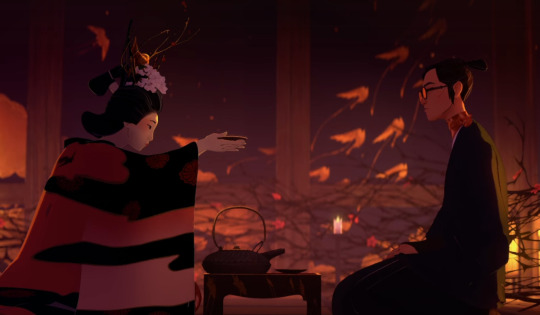
As I covered extensively earlier, Mizu and Akemi are foils, a yin-yang pair. But while they play off each other very well in a thematic sense, I personally believe that a serious romance between them will be more complicated if they become endgame. This is because Akemi's natural resolution is to embrace a position of power and influence, where she has both freedom and control over herself and to make much-needed changes in a prejudiced society. Meanwhile, Mizu's natural resolution is the opposite; her happy ending would to find a peaceful life where she is safe and free from prying eyes, and able to be her true self.
Thus, it would make very little sense for Akemi to forfeit power and run away with Mizu and start a humble life together. Akemi wants to be great, and that is absolutely what she deserves. On the other end of the spectrum, it would also make little sense for Mizu to dedicate her life in service of Akemi, such as acting as a bodyguard or something similar, because a life in a palace full of court intrigue and conspiracies is far from what Mizu needs to be happy.
With that being said, if Mizu/Akemi is endgame, and assuming their overarching character arcs do not shift directions, their love story would likely be either tragic, doomed, or bittersweet. I do absolutely love this type of story because personally I'm a sucker for catharsis, so it would be very interesting if the writers do decide to take this route.
Also, as a note, please do not take this as me dunking on this pairing. This is just my personal opinion and analysis and I completely understand if you disagree!
--
Then, of course, we have Option B: Taigen.
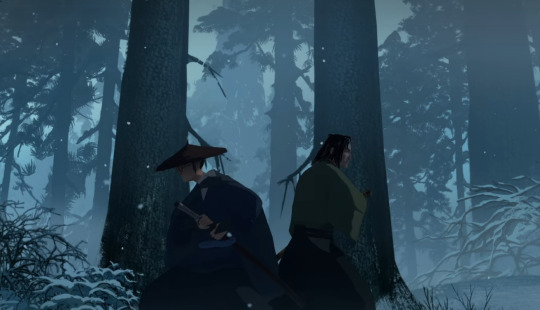
Between Akemi and Mizu, Taigen is a bit of a free-floater here, because Season 1 leaves off at a point where his arc is very ambiguous as to where it's headed. While Akemi climbs for greatness and Mizu goes on a journey across the ocean to (presumably) discover more about her heritage, we have little clues about where Taigen is headed. And if I'm being honest, I'm sure he has no idea either! He still hasn't reclaimed his honour, so he would be unable to rejoin the Shindo Dojo; he's been rejected by Akemi; and while he showed loyalty to the shogun, the shogun is now dead, and all the shogun's men who had witnessed his "humiliating" death were left to die by Lady Itoh, who is now pulling the strings within the palace.
Therefore, Taigen has very few options here.
And when considering his role in the story is as Mizu's begrudging ally, his arc will undoubtedly be focused on unlearning his xenophobia and misogyny, the latter of which we have not seen yet, but is surely present. Now, whether he will do this in Mizu's presence or absence will be unknown until we see Season 2. Following the Season 1 finale, he might return to Kohama and wait for Mizu there as he learns humility and remorse over his past cruelty; or maybe he will follow Mizu to London, and the two of them will continue to butt heads until he finally admits to himself that he cares for Mizu more than he would like to admit. There is no room for doubt that his growing feelings for Mizu are more-than-platonic, because we all saw him get turned on by sparring with her in Ep7 lol. Thus, regardless of the exact choice he makes, I am sure that his overall arc will be focused on redeeming his character.
Now, when it comes go redeeming him, I know there are many who simply don't want him redeemed because he was such a jerk to Mizu, and while yes I agree he was awful, I do believe there is also nuance to his character.
Previously I've discussed in great detail the colour and elemental symbolism with Mizu and Akemi, but have yet to touch on how they relate to Taigen. So, let's talk about that for a second.
While Akemi is red and Mizu is blue, Taigen is green.
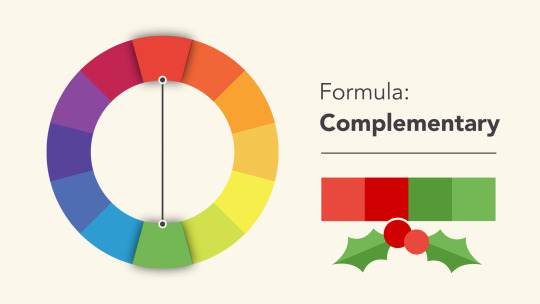
Green is a complementary colour to Akemi's red. Complementary colours are directly opposite each other in the colour wheel; when mixed, they neutralise each other, but when put side-by-side, they form a pleasing and impactful contrast that boosts the brightness and prominence of both colours. This mirrors Taigen and Akemi's relationship. They are an "ideal" pair because they complement each other very well, and bring out each other's most prominent traits. Mizu's comment about their similar "brattiness" comes to mind here.
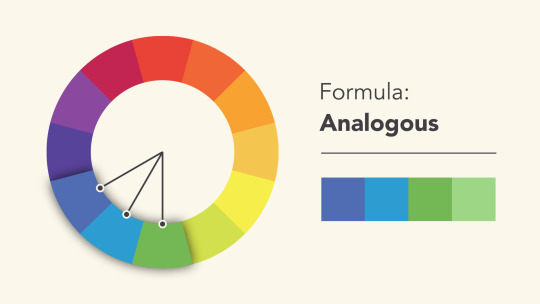
Green is also an analogous colour with Mizu's blue. These colours are sitting right next to each other on the colour wheel; their natural similarity makes it easy for them to form a cohesive overall appearance, but using both in equal amounts will make a design overwhelming and too busy. Thus, the best way to use analogous colours is to make one the dominant colour, while the other will serve as an accent. I feel this also speaks to the dynamic in Taigen and Mizu's relationship. They came from the space place, both from nothing; they're both strong fighters who love the sport, and work well together when fighting side-by-side; however, they butt heads too easily, mirroring how analogous colours can be too overwhelming when used in equal amounts. Thus, to work together in harmony, one has to be the dominant colour, while the other serves as the accent. In this case, the dominant force would be Mizu, as she is the protagonist of the story, while the accent would be Taigen.
By fulfilling this role as an "accent" to Mizu, Taigen's character would easily be slotted in as a the love interest. This is in contrast with a Mizu/Akemi relationship, whereby Akemi is Mizu's foil before she is Mizu's love interest. This is because, by being a love interest, a character usually takes a backseat in the story, serving the plot and the themes by playing a purely supportive role, and this is not possible in Akemi's case because her character exists to parallel and contrast Mizu (red and blue), and not to support her.
It is possible to serve as a supporting love interest in Taigen's case however. And this is because he, unlike the other characters, does not currently have a definitive place within the story. He initially served the plot as an antagonistic force, but now as he is slowly unlearning his prejudices and becoming a better person, he can no longer serve the story by acting purely as a rival.
Instead, he will serve the story by literally supporting Mizu. And this relates to Taigen being earth, which is steady, firm and reliable, unwavering in loyalty and principles, hardworking and rooted in stability, which is seen in Taigen's staunch and inflexible obedience to the traditions and rules of society. These traits are what make him a perfect samurai, but not a good man. However, unlike most people in their world, Taigen is still capable of change and redemption, which is why Mizu says that he has the potential to be great. Not great by way of power or glory, but great in character. Already, he is honourable to a fault, and does not betray Mizu even after she technically robbed him of everything he was striving towards. And when he was shot by an arrow in the chasm, he did not hesitate a second to tell Mizu to use him as a human shield and save herself.
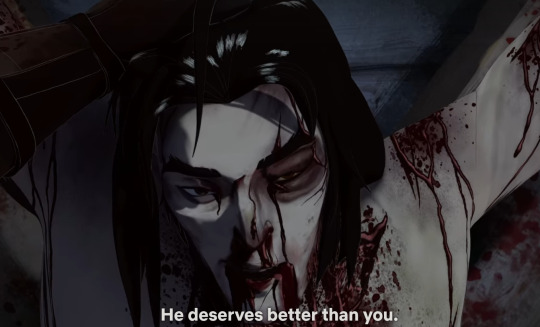
The trigger for his redemption is Mizu. If she had never beat him in that duel, Taigen would live on to become a man like Akemi's father. Cruel, power-hungry, controlling, conservative. But through Mizu, Taigen's sharp edges are ground down, much like water that wears down the stones in a river.
Where Mizu and Akemi's possible love story would be a clash of wills, full of passion and even heartbreak, a possible love story between Mizu and Taigen would be the wearing down of souls. Mizu would make Taigen a better person, and in turn Taigen would dedicate his full respect and support to Mizu as his equal, thus getting her to slowly open up and love herself. Already, Taigen has grown enough to admit (begrudgingly, and in his own Taigen way) that Mizu is better than him; though, clearly, he still has a long way to go, as he still calls Mizu a demon shortly after that.
But basically, Taigen is a very simple man (his main goal now is "to be happy"), and Mizu has great depths that he cannot yet fathom. For this love story to work, it has to begin with Taigen changing for the better. If he succeeds in that, and is able to accept Mizu for all her complexities, I believe that they will make a formidable pair. And though he'd likely still throw a jab or snarky remark at Mizu every now and then, I think he'd come tl wholeheartedly admire Mizu as a brilliant swordsman and a kind soul. Thus, should things work out and this be endgame, Taigen would be able to provide Mizu with what Mikio could not: an idyllic life that is not built on a lie, but mutual trust, respect, admiration, and equality.
Or hey, maybe they could both make their own dojo together! I don't know.
(Edit: This post by @rinandsketches does a great job at delving into Taigen's character and a potential Mizu/Taigen relationship if you'd like to read more about this angle!)
--
Now, as I move on from Taigen, there are a couple more options on how to resolve this love triangle and that includes Option C: Ringo.
In this option, Mizu does not have an endgame romance with either Akemi or Taigen. In this route, she finds peace and love through friendship, solidarity, and a found family between herself, Ringo and Master Eiji—a bunch of outcasts in society who make a strong trifecta of sword-makers.
Also, as an aside while I'm talking about Ringo, I'd like to point out that I believe his element is air and his colour is a neutral grey; he is talkative, easy-going, wise, curious, light on his feet (stealthy) and free-spirited, which are all traits linked to air, and traits that complement Mizu nicely, as he is capable of getting Mizu to open up and trust others again, while Mizu helps him reach his true potential for greatness.
--
And finally, there's Option D: Polyamory.
This is basically an "all of the above" option, in which everyone wins and it's a super duper happy ending. It would also be awesome to get some polyamorous representation, and seeing the dynamic between Akemi/Mizu/Taigen play out would be very entertaining and refreshing. So, you never know, this just might be the true endgame!
--
AAAAND with that, I close my extremely long analysis of what is essentially Mizu's love life. Whatever the final outcome of this love triangle though, I just hope it will be well-written and satisfying to all the characters' respective arcs. (Also I just want Mizu to be HAPPY goddamn it because she deserves the world and her coochie eaten out)
Now, I highly doubt anyone will read any of this (especially not until the end!) but that's fine. I just have so many thoughts and feelings about this show and I just needed to get this out of my system lol! But if by some miracle you did read this far, I wholeheartedly welcome any sharing of thoughts and ideas because man am I obsessed with this show! But of course, if we have an opposing opinions, please be respectful when letting me know; I am very open to friendly discussions.
#blue eye samurai#mizu x taigen#mizu x akemi#mizu blue eye samurai#mizu x akemi x taigen#blue eye samurai meta#also if you ask me PERSONALLY. based on my own analysis which you can read above. personally i'm placing my bets on option b (mizutaigen)#and this is simply bcs i think mizu deserves nice things and that includes getting dicked down and pampered and worshipped#whoops who said that#also mizu deserves to live a life where she can hand taigen's ass to him on a daily basis. ykwim.#BUT i am def open to a change of opinion regarding the mizuakemi rship as the story progresses#i just dont want the writers to reduce akemi into nothing but a love interest for mizu#the only way i can see a happy mizuakemi endgame scenario is if blue eye samurai becomes purely an angsty romance story#in which case then yes i fully endorse the akemi ending <3#but that would probs require a whole genre overhaul? bcs currently the show is firstly an action-epic where the romance is just a subplot#but even tho i dont reeeeally want a mizuakemi endgame i still DEF want mizu & akemi to be romantically and/or sexually involved plsss <3#like they cant have that slow-mo shot between the two of them as their first encounter and NOT DO ANYTHING W IT!!!#also i want mizu to be at LEAST a little sapphic plsplspls#shut up haydar#meta dissertations.pdf#haydar's fandom posts#i wrote this whole thing while delirious and covid positive
356 notes
·
View notes
Text
In discussions about the finale of Black Sails, one of the things I often see is folks hard-focusing on Flint's fate, in an either-or binary fashion, usually presented as "Which do you believe-- that Silver killed him? or sent him to the plantation?"
Now, for posterity's sake, gonna mention a few things-- first off, that's simply not thinking broadly enough. There are farrrr more than two options here and I've come up with my share of the reallyyyyy bad ones for sure. Whatever your mind chooses, none of those are happy endings anyway, there are bittersweet, bad, and worse endings all the way down. (They are paused, they are in a time loop, and also all endings and no endings are happening simultaneously)
But also, the more cogent point is that, it doesn't actually matter what happened *to Flint* The story is... not actually about him at that point. We have transitioned from Flint as protag to Silver as protag, setting up for (the fanfiction that Black Sails has ended up making of, ugh, king shit) Treasure Island.
And so, I just, don't find it to be of particular interest exploring what we think Flint is actually doing or if he's alive for real. What is EXTREMELY interesting to explore though is how Silver's speech at the end to Madi is sort of giving Thomas back to Flint as a pacifier/comfort object, but how... Silver is giving Flint that thing in his own mind as his own type of pacifier/comfort object.
That's the REALLY chewy bit. What actually happens to Flint is not the purpose of that scene for me, of Silver's recounting of events to Madi. It's more about... projection. It's about how Silver is dealing with whatever happened to Flint/whatever he did.
And I just feel like it's missing the point to focus so hard on if Flint is alive or not.
He is the ghost of the story regardless, that's what's important. He's going to haunt the narrative for the rest of everyone's lives. No one has been untouched or unscarred by coming into contact with Captain Flint; he has a forever legacy. I'm not the first to call him this, but he's Schrödinger's Flint and he's staying that way.
But this?
"No. I did not kill Captain Flint. I unmade him. The man you know could never let go of his war. For if he were to exclude it from himself, he would not be able to understand himself. So I had to return him to an earlier state of being. One in which he could function without the war. Without the violence. Without us. Captain Flint was born out of great tragedy. I found a way to reach into the past... and undo it.
There is a place near Savannah... where men unjustly imprisoned in England are sent in secret. An internment far more humane, but no less secure. Men who enter these gates never leave them. To the rest of the world, they simply cease to be.
He resisted... at first. But then I told him what else I had heard about this place. I was told prominent families amongst London society made use of it. I was told the governor in Carolina made use of it. So I sent a man to find out if they'd used it to hide away one particular prisoner. He returned with news. Thomas Hamilton was there. He disbelieved me. He continued to resist. And corralling him took great effort.
But the closer we got to Savannah, his resistance began to diminish. I couldn't say why. I wasn't expecting it. Perhaps he'd finally reached the limits of his physical ability to fight. Or perhaps as the promise of seeing Thomas got closer... he grew more comfortable letting go of this man he created in response to his loss. The man whose mind I had come to know so well... whose mind I'd in some ways incorporated into my own. It was a strange experience to see something from it... so unexpected.
I choose to believe it... because it wasn't the man I had come to know at all... but one who existed beforehand... waking from a long... and terrible nightmare. Reorienting to the daylight... and the world as it existed before he first closed his eyes... letting the memory of the nightmare fade away.
You may think what you want of me. I will draw comfort in the knowledge that you're alive to think it. But I'm not the villain you fear I am. I'm not him."
This is the speech of a man who is self-soothing, who is spinning himself a tale, who is projecting, who is coping.
and THAT is just, way chewier, innit?
#Now that's just from a canon point of view#once we start to delve into like fan fiction#Because fic must necessarily change the story and change canon because it's creating something new#so of course then figuring out what you want to do with flint post canon is necessary#but for me fanfiction is a different realm than canon only based meta conversations about the show#black sails meta#long post#black sails#john silver#james flint#thoughts#black sails spoilers#I was coaxed into writing my group chat meta into a post by the Committee mwah
498 notes
·
View notes
Text
Lan Xichen is clearly shaken by what WWX and LWJ tell him about NMJ’s death after the discussion conference. He has doubts, he is concerned, and in response to this he decides to USE THE EVIL SPIRIT AFFECTING MUSIC ON HIMSELF to SEE IF IT HARMS HIM.
(A normal and hinged thing to do)
(it harmed him)
If we use Nie Mingjue’s behavior as a metric for what this selection from the Collection of Spirit Turmoil does to a person, we can reasonably assume it causes or exacerbates at least SOME of the following:
Disrupts spiritual energy such that a person progresses towards qi deviation
Emotional instability
Violent outbursts
Prone to suspicion or paranoia
Nie Mingjue is already prone to literally all of these things, but they ARE also the things the seem notably exacerbated at the end of his life. Whether it was The Song itself or merely the proximity to qi deviation which caused/exacerbated these things, we cannot be sure, but as the latter is caused by the former, there is no functional difference.
In Guanyin Temple, very shortly after Lan Xichen would have used the song on himself, he is notably distressed, his faith in JGY is further shaken, and he’s manipulated by Huaisang into killing Jin Guangyao-- something that is both understandable in context AND clearly horrifies him for the rest of his life.
Given the circumstances (learning what he’s just learned about JGY’s involvement in NMJ’s death, and then learning everything else he does during this scene), he was going to be upset with Jin Guangyao regardless. He was going to have questions, he was going to have doubts. But I do think it’s WORTH REMEMBERING that this man had JUST used the same song ON HIMSELF that Jin Guangyao used to speed up/cause Nie Mingjue’s qi deviation and death. It provides additional context for his reactions, both within the scene and after it.
Lan Xichen has spent over a decade on the same page with Jin Guangyao about JGY’s motivations, goals, and often even the unfortunate but necessary methods he needed to use to achieve said goals. LXC is not NMJ; he absolutely understood that JGY going undercover during Sunshot involved killing some of their own people, and he understands that that was unfortunate but necessary. He understood JGY’s situation with his father, understood that JGY was not in a position to do anything about JGS’s decisions wrt Xue Yang, supported JGY through everything it took to make the watchtowers a reality. NMJ told LXC about JGY killing his superior officer, and LXC went “I’m sure he had a good reason” and just MOVED ON. He’s not under the impression that JGY has never hurt anyone, broken the rules, or committed a crime-- he just does not care, because he truly believes that JGY is a smart, capable, and well intentioned person and therefore those are things to be understood and compassionate about, rather than condemn and scorn him for. He may not have been aware of the extent of JGY’s crimes, but he didn’t feel like he NEEDED to be. He knew JGY, and that was enough.
Under normal circumstances, Lan Xichen’s wish when finding out something that upsets him (especially with regards to his friends), is clearly to talk about it. The greatest example is when Nie Mingjue loudly and repeatedly threatened Jin Guangyao’s life-- Lan Xichen wanted to talk it out. FOREVER, if need be. This is a man who understands that mitigating circumstances exist (especially when it comes to JGY) but solves problems with people he KNOWS with words.
So he finds out JGY killed NMJ, and his response is horror. And his solution to that horror is that he wants answers. He wants to talk about it. Why didn’t you tell me? If you felt you were backed into a corner, why didn’t you tell me that either?? Why didn’t you come to me??? TALK to me???? It could have all been delayed even longer solved if only--!!!
And yet, despite more than a decade of defending JGY in the face of an entire society blaming JGY for everything they could, in Guanyin Temple he’s swept up in the mood of the scene and condemns JGY with the rest. He knows JGY better than anyone else, but is made to doubt this. He’s left wondering if he ever knew the man at all, simply because he’s shown a new side of him.
And he responds to that feeling with violence.
He lives in a world and holds a position in said world that necessitates and normalizes violence, but he himself is not prone to it, especially with loved ones. Yet he doesn’t threaten to tie JGY up, magically mute him, have him tried for his crimes, nor does he SIMPLY react instinctively in perceived self defense-- it’s notable that he threatens death. While the circumstances are different, he does the same thing Nie Mingjue did (threaten JGY’s life), and I don’t think it’s irrelevant that he must be not entirely himself to get to that point.
In the Untamed, during the Guanyin Temple scene, he even slaps Jin Guangyao. And while I believe this is not canon to the book, I don’t personally think it’s out of character BECAUSE I think it’s a further nod to there being something wrong with him in this scene.
And his actions in that temple is, again, something he struggles to grapple with and regrets for, as far as we know, the REST OF HIS LIFE.
Right until the last moment, Guanyin Temple is a scene in which Lan Xichen is made to suspect that he’s never known Jin Guangyao at all, and Jin Guangyao is made to believe that he’s never mattered to Lan Xichen like Lan Xichen does to him. And in the very VERY end, when Lan Xichen chooses to die with him and Jin Guangyao doesn’t let him, they’re both shown that that doubt was unfounded. Jin Guangyao may be many things Lan Xichen was never willing or permitted to see, but he is also, fundamentally, everything Lan Xichen has known him to be.
And Lan Xichen never, ever, wanted to harm Jin Guangyao
#mo dao zu shi#chen qing ling#mdzs#Mdzs meta#the untamed#cql#lan xichen#jin guangyao#somebody suggested I write about the Lan Brothers and I didn't have any meta about them BOTH brewing in my brain but I sure had this#so here you are#xiyao#lan huan#jgy#lxc
626 notes
·
View notes
Text
Every time i think about atsv and its themes, my mind keeps going back to the scene with Miles and his parents in that college counselor’s office, and what its purpose is.
It establishes the strain that being Spider-Man has put on their relationship, yes - it also establishes that Miles feels trapped and limited, yes - but a lot of fandom discussion overlooks the important parallel that that scene sets in motion between racism in academia and Miles' rejection from Spider Society.
By now, everyone has already figured out that the issue with the 'Canon Event' theory is that it assumes that trauma - specifically experiencing the "right" traumatic events - is what makes a Spider-Man, and it is wrong for Miles to be required to accept this. It isn't enough that he had his uncle die, his father must die also because then he will have sacrificed "enough" to keep the canon intact. No one questions why arbitrary sacrifice is required at all.
The concept of the personal statement being required for college applications, I would like to argue, has the exact same issue.
Miles even says so in the beginning of the movie: "Having 'a story' in the first place sounds gross" (notice how Miles vocally critiques elite academia contantly and has been from the get-go. He is not an apolitical character like some might portray him to be).
It is not enough that Miles is an exceptional student with a variety of interests (art and science), he must have the appropriate traumatic "story" for white academic institutions to find him interesting enough as an applicant, even if the story they want him to tell is not actually his story (no, he is not from a "struggling immigrant family". They own an apartment floor and PR is in the United States). Just like the "Canon events" that Miguel describes are not Miles' story, and Miles does not want them to be because it requires the preventable deaths of innocent people.
In a similar way that has been touched upon more in wider fandom, Rio gives Miles a speech telling him not to let the people in these overwhelmingly-white spaces that he will be entering tell him that he doesn't belong. That speech, as we all know, ends up being a direct parallel to the way Spider Society treats him: he is simultaneously a charity case and a threat just by his mere presence. His very existence is disruptive to the canon: The spider wasn't "supposed" to bite him, he just got lucky. There is a reason why the visual of the ball with Miles' lottery number is constantly paired with the number on the spider that bit him; they are one and the same.
(Side note: this is also what makes Hobie's function as a character so interesting - The idea that you can just simply quit. You do not HAVE to be in these privileged spaces if they don't have your best interests in mind. You don't have to prove yourself to these people to be who you are. But that's a post for another day)
The reason I've been thinking about all this is because I feel like no one really touches upon why Miles' character exists. Like, on a thematic level. Yes, he's there to show that "anyone can wear the mask", but there's a lack of specificity in that statement that I wanted to address with this post.
Miles is a love letter to every black kid that's been told that they're only in the spaces they're in because they "got lucky". He's for every black kid that's ever looked at a college app and been told that they have to take their trauma and put it on display for some white admissions officer to shed a tear over. He's there to argue that you don't have to bend towards any of society's attempts to make a spectacle or a serviceable machine out of you, and that you can just be.
TL;DR: it was never just about the mask MWAH 🫶🏾
#miles morales#spiderman across the spiderverse#earth 42 miles morales#spiderman atsv#blabbering#every week i must be mentally ill about this movie because of the Themes and Narratives
224 notes
·
View notes
Text
I have mixed feelings on the discussion about how "nice" Astarion gets if you go the Spawn route with him. Now, I am not reading fic so I've not personally seen the extent of how far people are running with the “redeemed” narrative. I might be completely unaware of some truly unhinged “Astarion helps old ladies cross the road with a smile on his face and kindness in his heart” takes. And I will be the first to point out his approval in Act 3 doesn’t always point towards a huge change of heart.
The flip side of that conversation that I’m not seeing discussed that much is the way Astarion talks about himself as well as the way the companions talk about him after choosing the spawn ending. In the scenes directly afterwards, and even in the epilogue a bit- you can see a very changed man. Not necessarily a humane society volunteer, but at the very least someone who’s taking responsibility for their life and viewing the world in a way they hadn’t before. Spawn Astarion’s growth cut scenes were almost jarring for me to watch after years of being comfortable with the bitch boy from Early Access.
Astarion is not the only one talking that way though! Karlach, Wyll, Minthara, Jaheira! They all respond to him as though he is a changed man. I scoured to find the actual lines since I’m away from my computer, but no luck. That being said, I do know that pretty much each companion reacts to his decision not to follow through with Ascension and his time afterwards by essentially saying, “You can’t fool me, we know you’re a good person.” In various degrees of intensity.
I know in his dialogue with Minthara he dead ass says, “Yep, love fixed me. I’m better now.” And he says it with zero shame, he’s happy about it.
At points the way the companions and he talk about it makes me frustrated with certain reactions and approvals that remain in Act 3. The further you get from finishing his plot line, the less of a changed man he really seems. His approvals in general still line up with Ascended Astarion’s. Some of his reactions to things seem out of touch with the man seen in the grave yard. For example, his reaction to being cheated on with Mizzora. Not only does his acceptance of that just seem like a different character than the one we see in his scenes after the palace, a man who clearly views your relationship as a serious commitment that he is proud of. But it also seems bizarre that he would be okay with you betraying Wyll at this point in the story. The man we see telling the spawn to go to the underdark, who thanks Tav for standing by him, and gushes about being excited to live again and embrace the good with the bad seems entirely juxtaposed to the asshole he continues to be.
Which is not to say that I want him to be all sunshine and rainbows. It just seems inconsistent. I think a part of that comes from the need to keep his reactions neutral enough that they might work for both endings. The problem with that being that Ascended and Spawn Astarion are such vastly different people in their main story scenes that it’s kind of impossible to line them back up again afterward. For me, it was hard to find it believable. Either his post Cazzador scenes were out of character, or his continued reaction scenes were out of character- it just depends on which you prefer.
Circling back to my original point, I guess what I’m trying to say is that his graveyard scenes and the companion commentary do make me think that he is still heading in a redemption arc direction. That it isn’t inherently out of character for him to be written as a character with a complicated relationship with morality, but more often than not ending up on the good side of the spectrum these days. The way I interpret it, it’s not so much because suddenly he’s altruistic and nice. It’s that he’s actively choosing change, which feels like a continuation of his recovery. He’s surrounded by people who hold him accountable. He’s trying to be better than he was. He’s trying to do right by the people who have helped him. He’s still going to bitch about it, and act like it’s stupid. But he’s going to independently prompt that the group save the kid from the hag because “that’s just what we do, I’m done fighting that reality.” In his post-Cazzador life, his only real loyalty is to his team. If that team is full of annoying do-gooders? Their his annoying do-gooders. He’ll complain about it, but he’d not trade his found family for anything. It kind of gives Loki in Thor: Ragnorak showing up with the ship. Or Megamind saving the city. I’m here. I’m going to be the hero because I guess I have to. I’m going to be positively insufferable about it though.
I certainly don’t think he’d be nice all the time. I think he’d still be a loose canon that lashes out. He’s in the middle of healing, not at the end of it. But I think if his redemption journey ends where it did in the game, the emphasis on how changed he was in his scenes and the companion commentary was a bit over done.
#bg3#bg3 spoilers#astarion#astarion ancunin#brekkie thoughts#idk it’s late this is kind of rambles#apologies#i dont want him to rescue puppies or anything i just think him being the bitchiest hero is fun#like ugh i cant believe i am gonna rescue that old lady#random passer by: you don’t have to#astarion: oh no#im gonna
102 notes
·
View notes
Text
Growth (Part 3)
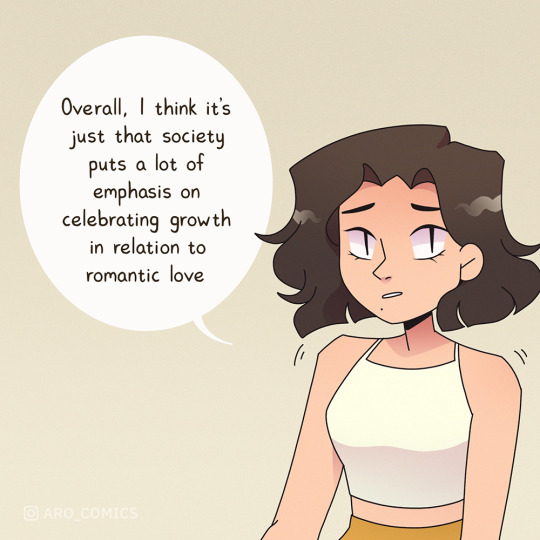


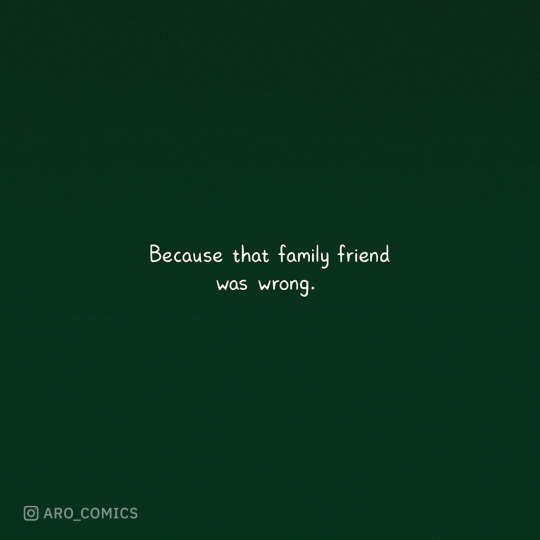
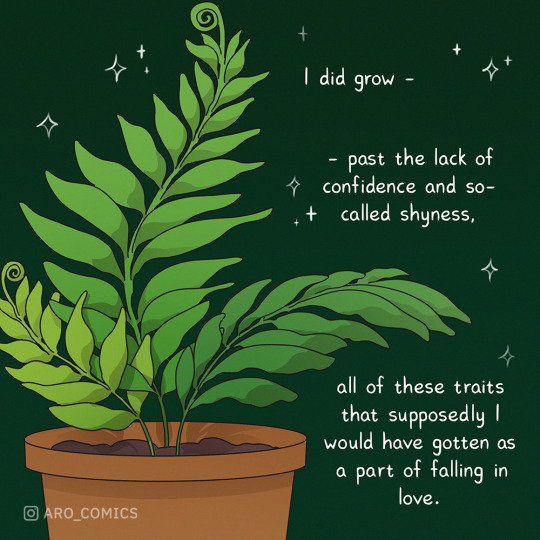

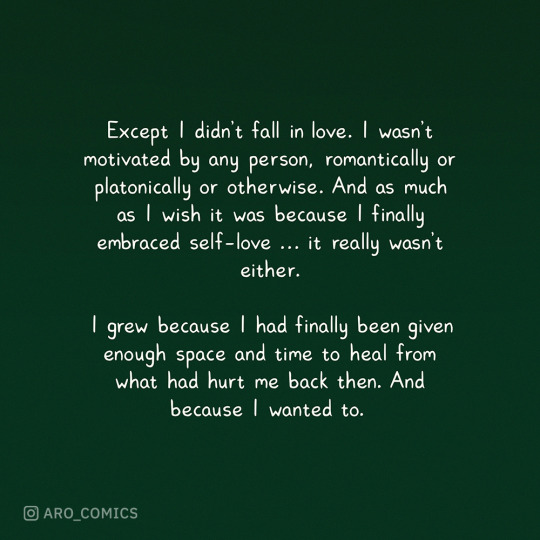


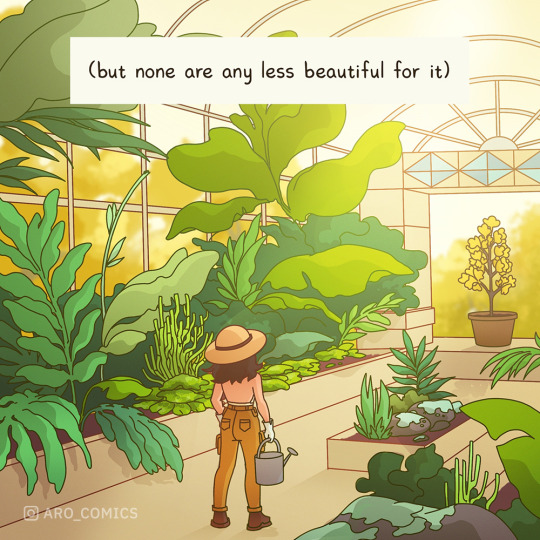
Growth, 3/3 - And … with that, we finish off yet another series 🐸🐸 I hope y’all enjoyed the ride, I know it’s been a long wait for this, but I really wanted to take my time and craft this comic and what I had to say with it (and also take my time with these last few greenhouse scenes haha).
I don’t think the ways in which amatonormativity affects us has been explored as much, since our awareness of the topic is so new. Or at the very least, I haven’t seen much discussion and I feel like we’re all just taking stabs at it atm. So here’s my take, it’s something I’ve reflecting on for quite some time, and I hope you’ve found it interesting too.
Also, this is less relevant to aromanticism, but I wanted to sign off on this: I know growing up I really clung to the idea of finding the *right* relationship, romantic or not, to be this kind of … magical key, to fixing many of my personal problems. But as I’ve learned through my own experiences, sometimes all you really need is the time and space to rest, to recover, and the will to try again at the end of the day (or the next morning, or whenever your strength returns).
If love and relationships have been the key to your healing and growth – fantastic! I’m genuinely so happy for you, and I think that is beautiful. But to anyone that needs to hear it, you can be fine too without. Your growth can be something that you shape and lead, and for what it’s worth. I think you will find at the end of the day the path you carve for yourself will be beautiful in its own ways, too.
Image Description:
Slide 1: Celia shrugs “Overall, I think it’s just that society puts a lot of emphasis on celebrating growth in relation to romantic love.”
Slide 2: “It’s all too common for me to hear people talk about how someone became nicer after they’ve found “the one”, how much better they are with a lover than without”
A younger Celia is shown studying as she listens to her parents converse. They say:
“You remember [redacted]?”
“Yeah”
“Yeah, he finally got a girlfriend and its like he did a complete 180 as a person. He’s so much nicer and more patient now …”
Slide 3: Celia says “ – and as an aro, I just … wish that there was just as much focus, and celebration, for the ways people grow in the absence of romance, or any kind of relationship.”
Slide 4: “Because that family friend was wrong.”
Slide 5: “I did grow, past the lack of confidence and the so-called shyness, all of these traits that supposedly I would have gotten as a part of falling in love.”
A pot of ferns is drawn growing, unfurling, reaching towards the top of the panel.
Slide 6: “I became strong, confident. More patient and kind and understanding than I had ever been, all of these traits that supposedly would have been the rewards of love,”
Celia sits in her gardening attire. From her hand floats a fern unfurling, with sparkles in the background.
Slide 7: “Except I didn’t fall in love. I wasn’t motivated by any person, romantically or platonically or otherwise. And as much as I wish it was because I embraced self-love … it actually wasn’t either.
I grew because I had finally been given enough space to heal from what had been hurting me back then. And because I wanted to.”
Slide 8: “People love to say that everyone eventually blooms in the presence of “true love”, but I’ve always disagreed. Celia is illustrated talking to a blank person, from which a speech bubble shows a flowering plant. Celia says “I don’t agree”.
Slide 9: Back in the greenhouse, Celia is shown watering plants as the sun shines behind her. “In nature, not every plant flowers.”
Slide 10: “And those plants are no less beautiful for it.”
Shot pans out into the wider greenhouse, an array of nonflowering plants depicted around Celia as she stands with her watering can. The afternoon sun pours into the building, illuminating her and her surroundings.
1K notes
·
View notes
Text
Going Out
Whether you loved, liked, were neutral, or outright hated today’s Step by Step episode, I want to talk about one of my most favorite (and poignant) moments of today’s episode.

This hand holding scene.
But, wka, there are so many other scenes for you to focus on! You say. But, wka, there were multiple spicy scenes you need to do body language break down on. But, wka, last week you wrote a 20 page deep dive in to Pat’s psyche. Why are you hyperfixating on this four minute sequence???
BECAUSE THE SOCIAL COMMENTARY TEE AND THE REST OF THE PRODUCTION TEAM IS GIVING HERE IS BEAUTIFUL, BRILLIANT, AND LOWKEY MAKING ME EMOTIONAL GODDAMMIT.
As someone with strong, deeply rooted beliefs in empathy, in connection, in harm reduction, I can firmly and sincerely say there are people who I consider a part of my community, who I care for deeply, who are my friends who are homeless, who are drug users, or who are homeless drug users. And having worked in harm reduction before let me tell you how truly wonderful and enraging it is to provide people basic services and treat them with basic goddamn dignity and respect and how genuinely surprised, uncertain, or overjoyed my unhoused and/or drug using loved ones are to have someone who actually cares about them.
SO, I present those pre-emptive thoughts and personal background as proof of concept for what I am about to glean from this whole scene.
The scene transitions from flirting to community service when Jeng asks Pat if he wants to come with him to give food to the homeless, and I don’t remember this but @bengiyo did but this is something Jeng has been doing since Episode 1, and it shows in the reception Jeng receives when he arrives to this spot under the bridge.
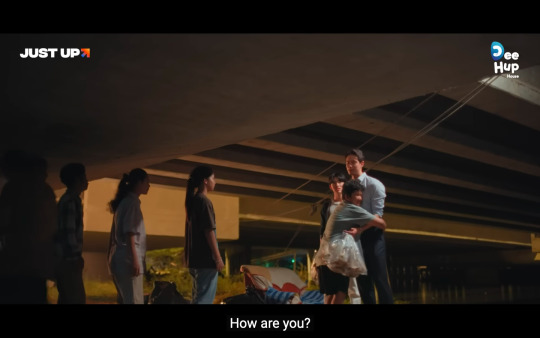
The people who live here know Jeng, the people who live here like Jeng, he comes here often enough that he has established a rapport with their community and it is so so wonderful for me to see this nepo baby raised on rich bitch juice feeling comfortable and at ease with a group of people that society (at least Western society) almost always ignores, belittles, or downright dehumanizes.
And if I wasn’t already impressed with how Jeng and Step by Step as a whole was handling its portrayal of cultivated relationships with unhoused people, Jeng takes this even further, when he hands the woman the rest of the food bags:


Now, this is a brief scene and we don’t get a lot of information at all about the people who are living here, but in my mind, or rather the indication I have for this interaction is that Jeng has identified a community pillar, trusts that community member, and is recognizing and valuing the autonomy of the community to distribute the rest of the resources they have been given.
Most everyone Jeng handed food to wandered off and went about their night, leaving Jeng and Pat alone to sit and talk. Under a bridge. With homeless people nearby. Rather than leave. This is SO IMPORTANT TO ME. It is SO SO SO important to me that Jeng and Pat don’t just show up, hand out food, and immediately return to Jeng’s fancy car to drive back to Jeng’s fancy condo but that they stay and they talk here under the bridge, maintaining a respectful distance since Jeng and the rest of the people in this scene do not appear to have built a strong enough relationship to join them directly, but sharing space nevertheless.

(I will not talk about barriers, I will not talk about barriers, I absolutely, positively will not talk about how Jeng has spent most of the show with a vertical line between him and Pat, and Put spent most of Episode 7 with vertical lines keeping him out of Pat’s world, and now that Pat and Jeng are an item, they are sitting together inside double barriers, boxing themselves in having a discussion on cruelty because they are still in the phase of their relationship where the two of them are in their own little world and hiding from the world at lar... FUCK I talked about the barriers)
ANYWAY, I absolutely will not talk any more about the barriers and will instead begin my descent into madness in the form of The Proffering of the Hand.
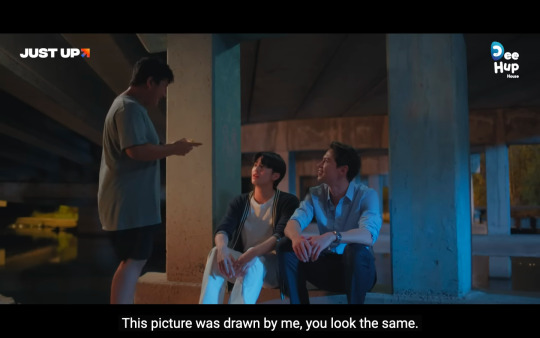
The build up to this moment starts when Jeng and Pat settle down to talk. They are sitting as close together as they can be without physically touching, they are openly flirting, they are making prolonged eye contact. Basically, they are being very obviously gooey, and the community member who appears to be the closest to Jeng (this is the person who hugged Jeng when he arrived) comes up to him and Pat, and points out the drawing that he made and the similarities he sees between that drawing and the two of them.

The drawing is two stick figures of an undetermined gender (or if you want to read it this way, of a visually similar build [ie both people have triangle chests and short hair, no obvious breast tissue, no differentiation in color, they their faces are a little different but they are nearly identical] so you could call this a drawing of a same sex couple and it wouldn’t be wildly off-base, especially not with the original artist here telling Jeng and Pat they look like the drawing). For the sake of making me feel even stronger about my love for this scene, lets say this is a drawing of a same sex couple.
Now the two lines this person says to Jeng and Pat are particularly striking to me:
“This picture was drawn by me, you look the same”
“It looks like us.”
Both of these lines are said by the artist. You can interpret that “it looks like us” line however you want to, but baby that’s queer to me.
The artist walks away, leaving Jeng smiling softly to himself, thinking about it for approximately three seconds and then proffering his hand.

Now, Jeng and Pat have not…how you say….been particularly careful about maintaining appropriate distances from each other anywhere since they started jumping each other for sport, but the touches they give to each other in the workplace are secret, are hidden. Hands held between them on the computer in a cubicle where no one can see, arms pressed up against each other so they can be mistaken for just being cramped, footsie under the table away from prying eyes.
Here, now, is the first time since they got together that Jeng overtly, publicly extends a hand to Pat in a move that cannot be mistaken as anything but romantic. Pat is, rightfully all things considered, a little apprehensive.
“What is it?” he asks
“It’s like the picture that he drew,” with a smile and a soft nod to his hand.
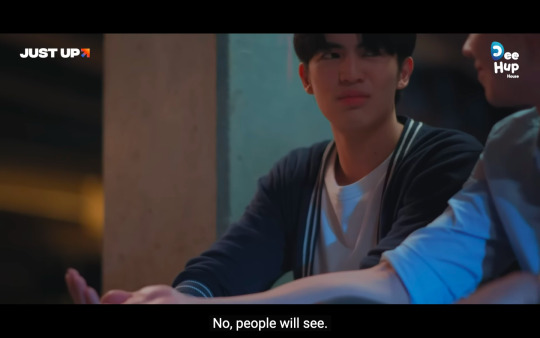
Pat’s brow furrows, he looks to his right, where the people they visited are sitting, he looks to the left his eyes scanning for any other potential witnesses. Pat, who has been the person consistently approaching this relationship with the most caution, is initially hesitant to take Jeng’s hand; Is initially hesitant to confirm their relationship to one another with other people around.
“No, people will see”
“No one will see” Jeng says, and I want to make it clear here that this is not a situation where Jeng is saying that the unhoused folks sitting nearby aren’t people.
I interpret it more as there is no one around who would be unsafe for us to be visible to.
Pat takes Jeng’s hand. Right here, out in the open, with people around him, he takes Pat’s hand in his outside of their houses, outside of Jeng’s car, outside. Outside. OUTSIDE.
So why is this such a monumental occasion for me?
I feel like I always say this, so eventually I have to make it happen, that I need to familiarize myself more with Thai social issues, because I don’t know much about Thai homelessness, and which populations of people are disproportionately represented there. So when I saw this scene, the only way I could approach it was with a Western lens. And I am comfortable running with my thoughts here using that Western lens because Pat references American homelessness in his conversion with Jeng.
Which means, dear readers…
The first thing that came to mind for me when Jeng and Pat were visibly queer here was the disproportionate rates of homelessness in the queer community in the United States.
Let me give you some quick (and very unfun) stats about homelessness and queerness in the United States:
40% of homeless youth are queer
Queer youth are 120% more likely to experience homelessness than non-queer youth
In one survey, researchers found:
8% of transgender adults surveyed had experienced homelessness in the past 12 months
3% of cisgender queer adults surveyed had experienced homelessness in the past 12 months
1% of cisgender heterosexual adults surveyed had experienced homelessness in the past 12 months.
All this to say, that there are close ties between queer people and homelessness.
And there is something extremely, extremely powerful in Tee and co. recognizing and affirming that queer people can be safer sharing space with homeless people than they might be sharing space with salarymen at a corporate office.
For a number of reasons, Pat and Jeng cannot come out at the office, even if that closet is glass. In huge part because a boss and subordinate relationship is a gross imbalance of power, but also because homophobia is rampant in that office. We saw it all the way in the beginning of the show, when Pat was asked if he was a top or bottom. We see it now, when Pat is overhearing his colleagues, his coworkers, that spent the beginning of his time at this office exploiting him to do their labor, saying awful, gross, disgusting shit about him and to him.
“I didn’t think he’d be working on his knees”
“Lick until you get your bonus”
These are things Pat is seeing, Pat is hearing in this place full of “people contributing to the betterment of society”, people who have stable housing, and cash to spare, and food to eat. People who aren’t looked down upon by society, people who reflect society’s current ideals and mindsets. The other queer people in the office clocked Jeng immediately, but Pat didn’t and neither did any of the straight employees in the office until Pat and Jeng started hanging around
each other more unable to turn off their heart eyes. Because Jeng is in a position of power, he dresses in traditionally professional clothing every day. Collared shirt of mild color, suit, tie, brown loafers. Compare him to Chot or Pat and you can see how Jeng blends in as straight to people who aren’t trained to clock that shit. Look at Jeng when he’s out of the office and hanging out around Pat, he is in denim, he is in white tank tops, he is wearing a chain. Jeng is putting armor on when he goes to the office. Pat and Chot don’t have that luxury.
And as a result, Pat and Jeng can only be out and open at home. Until now. Until this moment.
Step by Step definitively established in this one scene, in under FOUR MINUTES that Jeng and Pat, two queer men were made to feel comfortable enough and free enough in this place in this space around people who are often villainized, who are often deprived of human rights, people who are often seen as deserving of their poverty and the treatment they get from others as a result, people who are frequently spoken about as being a negative impact on society (WHICH IS BULLSHIT BY THE WAY HOLY FU- *I am forcibly removed from my pedestal*) because queer people are often villainized, deprived of human rights, seen as deserving of the terrible treatment that they get, and are frequently spoken about as being a negative impact on society.
And considering the statistics on how many homeless youth are queer, there is something to be said for the way the person who appears the youngest, or who at least is acting the youngest, is the person who initiates the interaction that signals to Jeng that they are safe here. That helps Jeng and Pat realize they can engage in a public display of affection here amongst people who understand.
And that is one hell of a fucking statement to make if I do say so myself.
Side Note 1: I was already leaning towards this show being a For, By, and About Queers show. This scene solidified that for me.
Side Note 2: I am thinking about the BL trope of the BL Bridge, I think this was something that @absolutebl wrote about once, but please correct me if I am wrong. If you are new to BL or otherwise unfamiliar with the trope, it is essentially just a repeated theme in multiple BL shows where one of the couples kisses in front of famous bridges in Bangkok. It is notable that in a show like this that is For, By, and About Queers (and boy do I have more thoughts on when and where and how the connection between Jeng and Pat deepens over the last couple episodes in relation to the workplace and homophobia (see @bengiyo’s quick thoughts which will hopefully become bigger thoughts on queer people and corporate culture)) that Jeng and Pat’s first openly public display of affection happens not on the surface, not lit up by bridge lights, not where the whole world can see them. But underneath a bridge, hidden away with the rest of the people that society has shunned, looked down upon, dehumanized, ignored, and failed to support.
(tagging @neuroticbookworm who is waiting patiently and @waitmyturtles because if I know one person on this website who is gonna add something incredible to a discussion of homelessness in this scene, it's gonna be my bestie.)
#yall better fucking cry at this one cause I almost cried writing it#step by step#step by step the series#step by step episode 10#tee bundit#patjeng#jengpat#manben#benman#jeng x pat#pat x jeng#chot x krit#ben bunyapol#man trisanu#bruce sirikorn#dee hup house#i am DEEP in my feelings tonight yall#and now i collapse in to bed because it is *way* past my bedtime#homelessness
185 notes
·
View notes
Note
What do you think about the concept of "since kink and porn is an art form, you should be able to critique it like an artform" (but like, with actual critique rather than just kink-phobia AND ALSO don't critique someone's specific piece of art if they didn't ask you to, like we're still applying the basic rules of art critique to this).
In the same way you would examine and criticize someone animating a character saying something violently transphobic, you would criticize someone for making violently transphobic porn. (Of course there is nuance to this, just because a character says something violently transphobic doesn't mean the creator is transphobic in that and same with violent transphobic porn)
But I guess in order to get to that point, we need to get past the "it's not morally pure" and "you're gross for liking that" type shit in order to do that in a healthy way. Because I believe there is a healthy and honest way to critique porn and what kind of message people are putting out into the world with porn (oddly enough, porn can be used as propaganda), but I don't think we as a society are ready to do that with the current state of puritanism.
I would say, one, that kink =/= porn. I think it makes sense to critique porn like an artform, but kinky sex in private is, y'know, private, so it would be weird to try and artistically critique someone's sex life. Not all kink exists for public consumption & it private kink shouldn't be judged like its inherently meant to be consumed by the public. Porn, on the other hand, is meant to be viewed (for purposes of arousal), and that includes kinky porn. (Also, we can critique the way people do kink, but I don't think that should be compared to how art is critiqued yk? Like there's a difference between artistically critiquing movies about sports and critiquing the way sports are played. And when it comes to interpersonal relationships it should really be left to people actually involved in the situation since they know their needs best.)
I definitely think there's merit in critiquing porn in an artistic sense. But it definitely has to be done from a perspective outside of "this is depicting a Bad Thing and making it seem like a Good Thing, therefore its Bad." Personally, I think more should be done to emphasize the kink aspect of kink- a lot of CNC porn removes the context of kink, which is extremely important for not only engaging in but just understanding CNC. If you listen to people who have rape kinks & engage with them in healthy ways, its very clear that part of the arousal is the fact that its in a kinky context, and the knowledge that you either have power taken away or are given power based on mutual trust. I said this before in another post but I think a lot of the negative things attributed to kinky porn itself comes from people consuming it without having any kink education to put that porn in context. But this has to come alongside systemic changes to how we approach kink and sex in general, and make it easier for people to get educated about these things in an open way. I very strongly feel that we should have some kind of at least surface level kink education in sex ed- by "surface level" I mean, at the very least, getting the concepts of "scene" "safeword" "soft/hard limits" "SSC/RACK" "aftercare" etc. into the general consciousness.
Anyways, the point is that if your critique only goes as deep as "this makes rape seem good, and thats harmful!" then its not a very good critique. But something like "the choking method used is dangerous and shouldn't be encouraged" or "this video showed the discussion of safewords and limits before the actual scene, which emphasis that its a scene & encourages good communication" could be very helpful.
But also, why limit porn critique to that? I wanna see people writing articles about the camera angles & the talents of the performers.
152 notes
·
View notes
Text
Thinking about Garou
Question: "Compared to the first season, which draws attention to Saitama's exhilarating punches, the second season focuses on story development. Did you have any specific goals while drawing the story?"
Murata: "There was one thing that I requested from ONE Sensei before drawing my re-illustrated manga. At first, there were plans to cut out Garou's childhood with the bully in my version, but that scene really left an impression on me. I thought it was a vital part of understanding Garou's position, so I discussed it with ONE Sensei and requested that I be able to leave it in for y version. And it was paced so well in the anime! I believe it ended up being a very high-quality scene."
-- From the liner notes of One-Punch Man Season 2.
I'm including this because I feel it's fundamental to really talk about Garou with any depth. Garou without context does not make sense. He is a kind, sensitive, and thoughtful young man who wants to do good in the world. Yet, he caused a horrifying amount of harm, both directly and indirectly, and ultimately undermined his own goals.
I'm glad that ONE listened to Murata about keeping Garou's childhood flashback. Without it, he'd just have been a thug attacking heroes for no reason to us (pretty much as the heroes saw him). Not only that, but ONE has gone a lot further in the manga in showing us the context in which Garou grew up that's been very helpful for understanding who Garou is, what he saw, and making some sense of his powerful yet contradictory desires.
Ultimately Garou is Garou. He's his own person and the buck for his actions firmly stops with him. No matter what, I can't imagine him not being an independent thinker with the determination to put his thoughts into action.
But...
...the tragedy of his thinking becomes clear when we see his thinking of monsters as metaphors for what is misunderstood or unacceptable in ourselves (a popular enough one IRL where monsters aren't real) and compare it with the reality of his world in which monsters have won, successfully restricting humans to one continent, and people like heroes because they are reminders that sometimes, even apparently overwhelming evil can be defeated. Nothing good happens when you deny the reality around you.
You know Garou's rant about uniting the world with fear? It's a standalone rant in the webcomic. The manga gives us a snapshot of the context in which he came to this conclusion. As this is a place that is no stranger to natural disasters -- forget the monsters -- Garou has no doubt experienced at least one big storm, or flood, or earthquake, or volcanic eruption in his life. In those days and weeks that follow, he's no longer an outcast. Nobody cares about where you come from or who you are: people help each other. At least until normalcy is restored. That's something he's directly experienced.
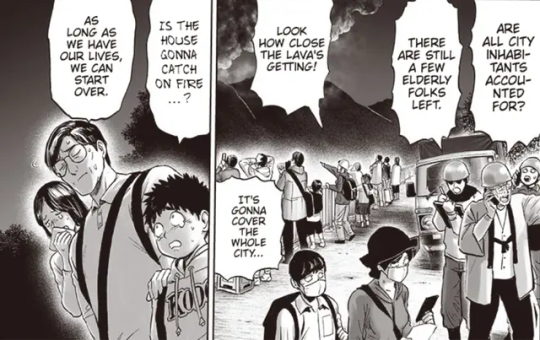
That's just human nature: even in individualistic societies, for every report of looting in the wake of a natural disaster, there are hundreds of people trying to help. And this is a much more collectivist society that has to deal with disasters semi-regularly. That's the sense of looking out for each other in the face of a tragedy bigger than any person he wanted to recreate—only permanently.
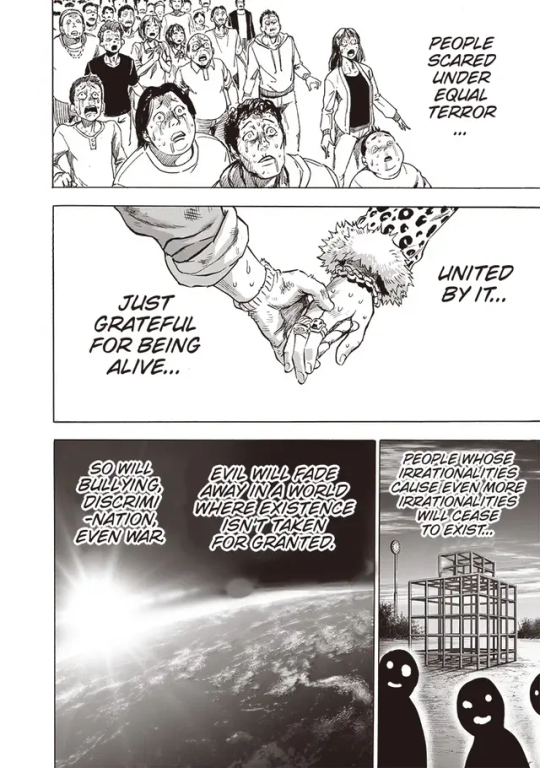
Then we get bits of Garou through the people around him. We got nothing about his parents in the webcomic but in the manga, his parents refuse to see him or get him out of custody. They've given up on him. To make it worse, the audience ONE is writing for understands that Garou is a minor until he's 20 (the law recently changed in Japan but it wasn't even up for debate when ONE started writing OPM). So they've done the equivalent of washing their hands of a 16-year-old. That's got to have hit Garou very, very hard, even if he was estranged from them. He'd have liked it if his father cared enough to tell him what to do.

We see how Bang has literally taken on the role of in loco parentis. It's been interesting to see that the reason Bang has chased after Garou so relentlessly is because he sees himself in the young man. However, we also see that he deeply misunderstands Garou too. Bang beat up people because he was an extremely selfish young man who felt he was entitled to everything.
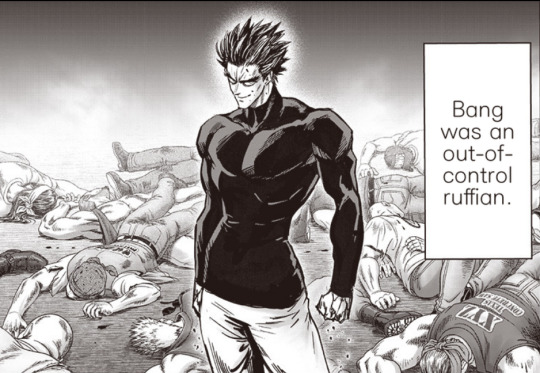
Garou beat up people because he is an extremely thoughtful young man who sees himself as bringing a great good into the world at the expense of some heroes.
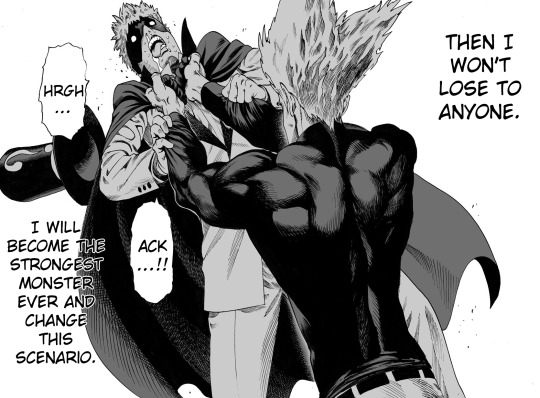
It's definitely going to cause trouble but that's okay -- nothing in life is smooth and such differences are inevitable. With love, such struggles are worthwhile.
Garou's an object lesson in why the energy to do things in the world rarely comes with the power to make those changes. His overly simple solutions were disastrous. But one thing we can also say about Garou: he's a fast learner. He's literally rebuilding his life little by little in the webcomic by rebuilding the world around him. In the manga, he's been given the opportunity to sift through his thinking and find what's genuinely good. We'll see how it all shakes out.
#OPM#meta#Garou#manga#webcomic#the road to hell is paved with good intentions has rarely been truer when it comes to Garou#I am glad the manga has drawn out more context for us to understand him better#and also given him more opportunity to confront his way of thinking
49 notes
·
View notes
Text
Mike & Superman
So, I want to take a second to discuss the Superman comparison from the van scene in relation to Superman in the comics (specifically his origin, or at least the version of it that Mike as a character would likely be familiar with).
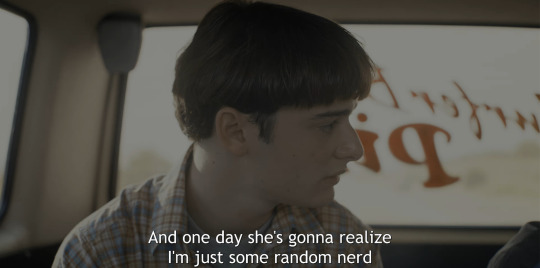

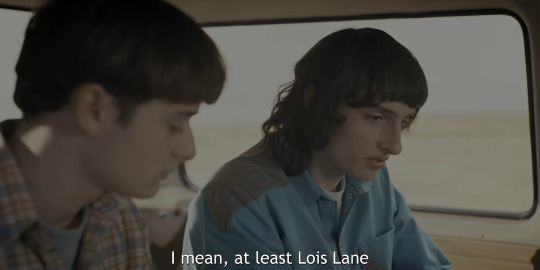
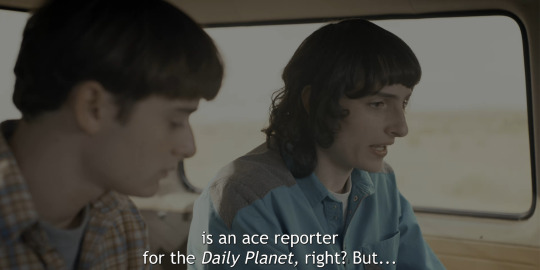
(Stranger Things S4E8)
The general situation I think we're all aware of is that Mike compares El to Superman and since El's his girlfriend (even though they weren't in the best standing the last time they'd talked before this, that's still more or less the situation) he makes an attempt to parallel himself to Lois Lane. Which makes enough sense at first glance—Lois is Clark's primary love interest, this is pretty common knowledge even among people who aren’t terribly invested in Superman lore. But from the way Mike trails off here, it's clear that he feels he doesn't measure up to Lois, he's just some 'random nerd' as he says.
Is that his self-doubt and insecurity talking? Absolutely. But I don’t think he’s wrong about one aspect of it—that he doesn’t fit the role of Lois Lane when we compare El to Superman. He does fit into the story in a different way though!
What I primarily want to talk about is rooted in his specific phrasing when he starts this comparison, "Superman landed on his doorstep." As evident from the bit of the conversation right before this, when he says that he's talking about when The Party found El in the woods, when she'd recently escaped and just 'needed someone'

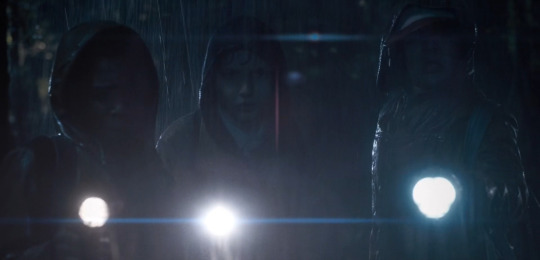
(Stranger Things S1E1)
And much like El, Superman did once crash land in front of some kind strangers when he entered into a world/society unlike the one he came from and definitely just 'needed someone'...
But Superman landed in front of Ma & Pa Kent, not Lois Lane.
Clark's origin has had many many retellings over the years, but from literally the late 30's this has been a consistent element of the story in basically every iteration—be it comics, movies, cartoons. Considering the time period Stranger Things takes place in, when talking about the comics (and like, we know our characters are comic nerds) I'd consider the Silver Age/Earth-One retelling to be the most relevant (because while Crisis on Infinite Earths did just happen in 1985, the Post-Crisis Superman lore updates weren't getting established until later in 1986 after S4 takes place):
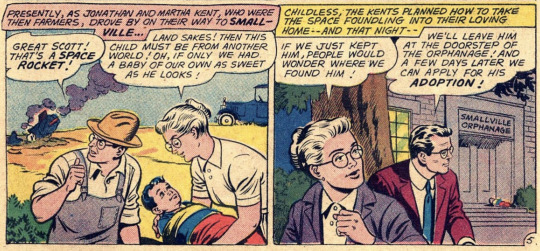
(Superman Vol. 1 #146)
And I mean... 'It would be suspicious to just suddenly have this child we found, so we'll try to have them be discovered somewhere else as if we hadn't been the ones to find them' sure sounds familiar
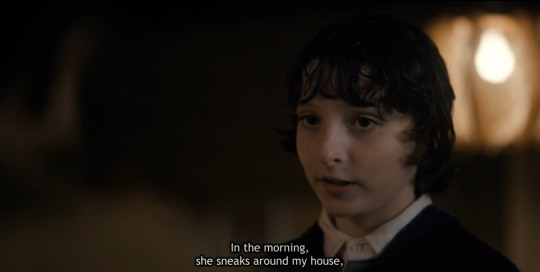

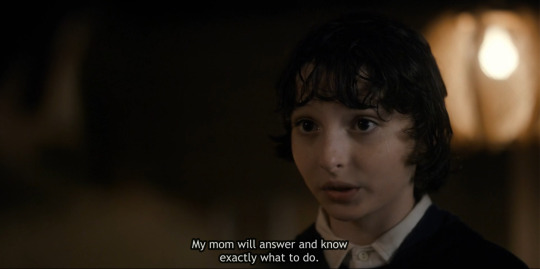
(Stranger Things S1E2)
But anyways, my point here is that the people who are there for Superman when he’s new to Earth—the people that take care of him and give him a new name—they welcome him into their family:
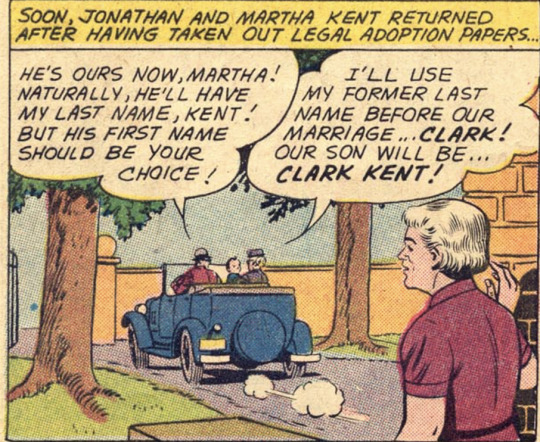
(Superman Vol. 1 #146)

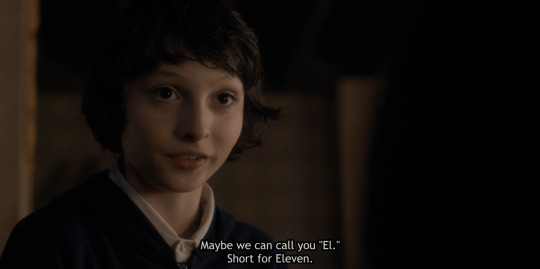
(Stranger Things S1E2)
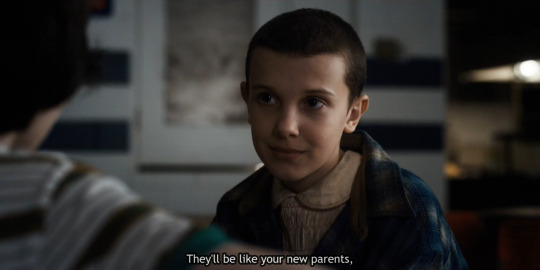
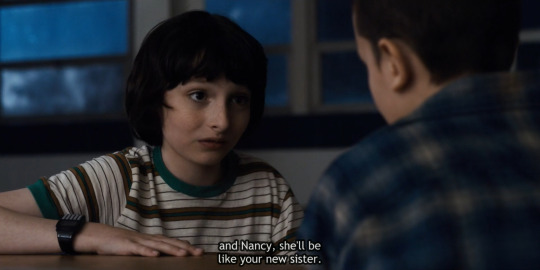

(Stranger Things S1E8)
...they're not his love interests. Like, Clark and Lois meet at the Daily Planet when they’re both adults:
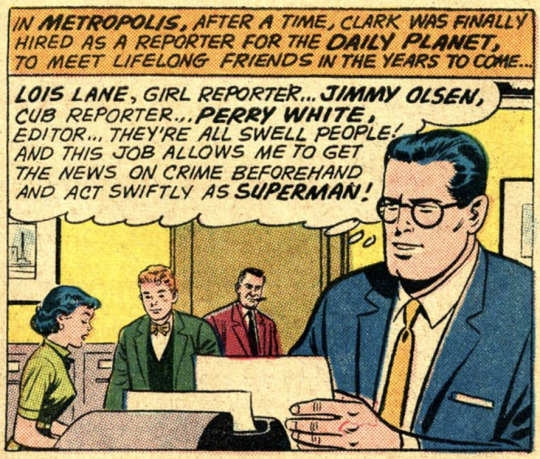
(Superman Vol. 1 #146)
They don't meet until after Clark has already spent years growing up on Earth, not when it's all entirely new to him! Lois isn’t his first girlfriend/teenage love interest, Lois is a person he falls for once he is his own fully realized adult person.
Mike doesn’t fit the role of El's Lois not because he's not good enough or any of the reasons his self-doubt might try to make him believe—he isn't El's Lois because that's just the wrong comparison for their situation altogether. When considering El to be Superman, with the way Mike starts this comparison he's (whether on purpose or not) paralleling himself far more closely to Superman's parents—his family—than Superman's love interest.
#stranger things#stranger things analysis#anti mileven#mike wheeler#idk if anyone has pointed this out before but i have not come across it 🤷♂️#tho i have seen many many people talk abt the ways mike & el get. family-coded a lot. and this is just another thing to add to tht pile
229 notes
·
View notes
Text
Felurian and Consent
content warning for discussions of sexual assault and rape
It had been a while since I have written a meta post for kkc but I just reread Wise Man's Fear and made myself read the Felurian scenes in their entirety.
And wow, am I mad at myself.
I cannot believe I let myself forget the way Kvothe clearly states Felurian breaching consent. The Felurian scene have always been upsetting to me, they never felt consensual, and many interpretations of the book had me thinking that maybe this was just me or just a very small section of the scenes.
But no. Kvothe initially gives consent to Felurian (well, arguably but thats a discussion for another time). He chooses to leave his companions to be with Felurian. And then he wants to leave. when he tells her he wants to leave, this happens: "My mind went numb as quickly as if I'd been struck a blow to the back of my head. . . I felt the need to have her. . .Only because of my Arcane training did I hold onto any concept of my own identity at all." (639)
He has revoked his consent and she had denied him the power to leave. She does not allow him to leave. Kvothe is an object to Felurian. If this is not clear enough in the abuse of power Felurian has, Kvothe then goes on to say he feels as he did when he was in Tarbean and sexually assaulted. "She touched my cheek softly. Softly, I bent to kiss her, and something broke in my mind. I felt the snap as four years of my life slid away. Suddenly I was back on the streets of Tarbean. Three boys bigger than me. . . had dragged me from the broken crate where I'd been sleeping. . . Two of them held me down. The third cut my clothes off my body." (641) Kvothe then describes that he was able to escape but still traumatized from the event. And that his state of mind was similar to how he felt when he was with Felurian. This wakes his sleeping mind, where he finds Felurian's name and finally has the power to leave, but hesitates because he doesn't want to kill her.
Kvothe does not have her name or the wind's name at his beck and call after this moment and persuades Felurian into letting him go by promising to make her famous in his song. He does not have consent to leave at any moment. And while she does show him kindness at moments, she is holding him against his will for most of his time with her.
Yes, he enjoys part of his time with her. Yes, he learns from her. But that does not negate the lack of consent involved with the entire interaction that often goes unnoticed in the fandom. And it would be easy to say an entire relationship was horrible and toxic but instead we see the push and pull of how toxic relationships can have caring moments while still revoking consent. However, the lack of attention people pay to Felurian as an absuer and rapist and how Kvothe is written off as simply "wanting fairy sex" when he literally is not in his right mind when he runs off and then has his ability to leave revoked by Felurian.
My conclusion, I suppose, is to stop writing off the Felurian scenes as frivolous sex scenes and acknowledging the lack of consent that is explicitly addressed and then the underlying threat to Kvothe's safety that persists from Felurian throughout the scenes.
I also suppose the issue of interpretation has many conflicting factors. For example, our patriarchal society doesn't like to view men as victims of sexual assault and women as perpetrators of sexual assault, which is also reflected in Kvothe's world as well, as when he tells the story, men are mostly excited on his behalf and women are rolling their eyes at his story. I think Kvothe's attitude towards it also reflects this. And this is why I think a lot of people misinterpret this scene.
I am interested to hear other people’s thoughts as I am still processing how these scenes were written and interpreted, both by the characters in the book and by fans.
#kkc#kingkiller chronicle#the wise man's fear#patrick rothfuss#felurian#my meta#i still don't think this post is fully formed#but discussions usually help me figure out my meaning#sorry I don't have a proper citation#its the first felurian chapter tho
113 notes
·
View notes
Text
We as a society do not talk enough about Freddy Carter's acting in EP 2x05, specifically the scene after the tea in Bhez ju
There are a lot of subtle things that a lot of people probably wouldn't pick up on unless you've had a panic/anxiety attack that I really admire and appreciate
From the moment that scene starts he is looking down, avoiding looking directly at anyone else
He has that exhausted, glazed over, not entirely present look
When he speaks it's quiet and slow, completely absent of the usual bite of sarcasm or annoyance
He only looks up and regains more of his usual attitude when Jesper speaks to him
And that could be interpreted in a couple different ways
Until then it's been all business talk, the seven of them all discussing the job. And as someone who has had a panic attack on the job in front of people ... it leaves a deep shame and embarrassment especially when it effects or hinders the job. And Kaz is obviously feeling that
But in a group conversation it's easier for him to avoid being the center of attention, yes he's still mostly leading the conversation, but the focus of the group is fairly evenly distributed between everyone
But Jesper makes it personal, he singles out Kaz and makes a comment directly to him and only him. And not just any comment. "It's as if I know you"
Now you could interpret that as simply Kaz having attention put on him and thus putting his facade of strength back on.
It could even be a fear of being known, or jesper noticing that he's struggling ... noticing his weakness. Of needing to mask it, so he looks up, he makes eye contact, he plays the character of Dirtyhands the gang leader and shoves everything else down
But I like to think of it another way.
Jesper is one of, if not the oldest friend Kaz has, and one of the people he trusts most. And Jesper may not have been present or known of Kaz's panic attack in shu han ... but he was there in the carriage to Hellgate. And what did he do? He immediately tried to help, and he never questioned it, never pried or made a big deal about it. He saw Kaz in a weakened state, and proved that he could be trusted with it, that he would help and not use it against him.
So rather than a fear of being seen in this moment, I see it was a comfort in being seen. "it's as if I know you" Jes may not know why Kaz panicked, or anything about his past, but he knows he has a weakness, and he doesn't think any differently towards him because of it.
And more than just the words he says, it's the way he says them, it's that usual casual way that Jesper talks, it's his lighthearted banter. It's normal ... as if nothing had happened.
And that is, in my opinion, why Kaz reacts the way he does. Because Jesper is safe, and with just a simple comment he has shown that he doesn't think any less of Kaz, and not even just Kaz as a gang boss but him as a person.
Kaz makes eye contact with him, and regains more of his usual attitude and behaviors for the rest of the scene, and that is, in my opinion, because of Jesper. Not because he is trying to fake normalcy to avoid being seen, but because he has been seen, and accepted without question or negativity. Jes has taken away his embarrassment and shame in that moment, not all of it, of course. But enough to handle, enough to go back to the task at hand, to move on to the next thing instead of focusing on his failures
This was supposed to be a praise of Freddy Carter capturing that post panick attack hangover but the kazper brainrot took over whoopsie
But yeah
Shout out to Freddy Carter for that scene
#six of crows#kaz brekker#dirtyhands#the bastard of the barrel#jesper fahey#shadow and bone netflix#shadow and bone season 2#kaz x jesper#kazper#kazper brainrot
88 notes
·
View notes
Note
An underrated Jack moment that I haven't seen discussed at all is the ep with Red's c-section. He's entirely confident in his ability to do it, but the second Red refuses his care he's thinking up the best possible alternative to save her life while respecting her wishes (and of course the solution is Belle). I can imagine someone like Sneed or the Prof insisting they do the surgery anyway "in her best interests" despite her wishes. Jack's unfailingly professional about it all though.
I’m sorry I’m so late to responding to this. Mideterms have been midterming haha 😅
But YES! You get it! I’ve said it before but there’s something so appealing about Jack’s character in that he has that snark and confidence and a little bit of arrogance that’s typical of the quick witted genius prodigy character types. But he’s still likable and not annoying because although he’s an asshole to people like Sneed or Gaines he’s respectful to people who are genuinely good or more disadvantaged than him.
I can’t quite explain exactly what it is other than vibes but he’s one of those “I’m better and smarter and more skilled than you” characters but in a different font because he does very much still have insecurities and morals. His wit and mind still aren’t quite enough to outweigh his station in society so he can’t just do whatever he wants. And like you mentioned with this episode he has extremely strong professionalism that he won’t compromise as a doctor he doesn’t put his arrogance above his patients like I feel we so often see with these types of characters.
I could talk about the storytelling genius of this show for hours lol but the point is yes you’re right that scene is so underrated!
#we love complexity#the artful dodger#the artful dodger disney plus#the artful dodger hulu#artful dodger#jack dawkins analysis#jack dawkins#commentary#my post
46 notes
·
View notes
Text
Summary: Chapter 4 of Critical Intersex
For many of us, Chapter 4 of Critical Intersex (2009) turned out to be a particularly rich source of information about intersex history. So I (Elizabeth) have decided to give a fairly detailed summary of the chapter because I think it’s important to get that info out there. I’m gonna give a little bit of commentary as I go, and then a summary of our book club discussion of the chapter.
The chapter is titled “(Un)Queering identity: the biosocial production of intersex/DSD” by Alyson K. Spurgas. It is a history of ISNA, the Intersex Society of North America, and how it went from being a force for intersex liberation to selling out the movement in favour of medicalization. (See here for summary of the other chapters we read of the book!)
Our high level reactions:
Elizabeth (@ipso-faculty): Until I read chapter 4, I didn't really realise how reactionary “DSD” was. It hadn't been clear to me how much it was a response to the beginning of an organized intersex advocacy movement in the United States.
Michelle (@scifimagpie): I could feel the fury in the writer's tone. It was a real barn burner.
Also Michelle: the fuckin' respectability politics of DSD really got under my skin, as a term! I know the importance, as a queer person, of not forcing people to ID as queer, but this was a lot.
Introducing the chapter
The introduction sets the tone by talking about how in the Victorian era there was a historical shift from intersex being a religious/juridical issue to a pathology, and how this was intensified in the 1950s with John Money’s invention of the optimal gender rearing model.
Spurgas briefly discusses how the OGR model is harmful to intersex people, and how it iatrogenically produces sexual dysfunction and gender dysphoria. “Iatrogenic” means caused by medicine; iatrogenesis is the production of disease or other side-effects as a result of medical intervention.
This sets scene for why in the early 1990s, Cheryl Chase and other intersex activists founded the Intersex Society of North America (ISNA). It had started as a support group, and morphed significantly over its lifetime. ISNA closed up shop in 2008.
Initially, ISNA was what we’d now call interliberationist. They were anti-pathologization. Their stance was that intersexuality is not itself pathological and the wellbeing of intersex people is endangered by medical intervention. They organized around the abolition of surgical intervention. They also created fora like Hermaphrodites With Attitude for the deconstruction of bodies/sexes/genders and development of an intersex identity that was inherently queer.
The early ISNA activists explicitly aligned intersexuality in solidarity with LGB and transgender organizing. There was a belief that similar to LGBT organizing, once intersex people got enough visibility and consciousness-raising, people would “come out” in greater numbers (p100).
By the end of the 90s, however, many intersex people were actively rejecting being seen as queer and as political subjects/actors. The organization had become instead aligned with surgeons and clinicians, had replaced “intersex” with “DSD” in their language.
By the time ISNA disbanded in 2008 they had leaned in hard on a so-called “pragmatic” / “harm reduction” model / “children’s rights perspective”. The view was that since infants in Western countries are “born medical subjects as it is” (p100)
Where did DSD come from?
In 2005, the term “disorders of sexual differentiation” had been recently coined in an article by Alice Dreger, Cheryl Chase, “and three other clinicians associated with the ISNA… [so as] to ‘label the condition rather than the person’” (p101). Dreger et al thought that intersex was “not medically accurate” (p101) and that the goal should be effective nomenclature to “sort patients into diagnostically meaningful groups” (p101).
Dreger et al argued that the term intersex “attracts the interest of a large number of people whose interest is based on a sexual fetish and people who suffer from delusions about their own medical histories” (Dreger et al quoted on p101)
Per Spurgas, Dreger et al had an explicit agenda of “distancing intersex activism from queer and transgressive sex/gender politics and instead in supporting Western medical productions of intersexuality” (p102). In other words: they were intermedicalists.
According to Dreger et al, an alignment with medicine is strategically important because intersex people often require medical attention, and hence need to be legible to clinicians. “For those in favor of the transition to DSD, intersex is first and foremost a disorder requiring medical treatment” (p102)
Later in 2005 there was a “Intersex Consensus Meeting” organized by a society of paediatricians and endocrinologists. Fifty “experts” were assembled from ten countries (p101)... with a grand total of two actually intersex people in attendance (Cheryl Chase and Barbara Thomas, from XY-Frauen).
At the meeting, they agreed to adopt the term DSD along with a “‘patient-centred’ and ‘evidence-based’ treatment protocol” to replace the OGR treatment model (p101)
In 2006, a consortium of American clinicians and bioethicists was formed and created clinical guidelines for treating DSDs. They defined DSD quite narrowly: if your gonads or genitals don’t match your gender, or you have a sex chromosome anomaly. So no hormonal variations like hyperandrogenism allowed.
The pro-DSD movement: it was mostly doctors
Spurgas quotes the consortium: “note that the term ‘intersex’ is avoided here because of its imprecision” (p102) - our highlight. There’s a lot of doctors hating on intersex for being a category of political organizing that gets encoded as the category is “imprecise” 👀
Spurgas gets into how the doctors dressed up their re-pathologization of intersex as “patient centred” (p103) - remember this is being led by doctors, not patients, and any intersex inclusion was tokenistic. (Elizabeth: it was amazing how much bs this was.)
As Spurgas puts it, the pro-DSD movement “represents an abandonment of the desire for a pan-intersexual/queer identity and an embrace of the complete medicalization of intersex… the intersex individual is now to be understood fundamentally as a patient” (p103)
Around the same time some paediatricians almost came close to publicly advocating against infant genital mutilation by denouoncing some infant surgeries. Spurgas notes they recommended “that intersex individuals be subjected (or self-subject) to extensive psychological/psychiatric, hormonal, steroidal and other medical” interventions for the rest of their lives (p103).
This call to instead focus on non-surgical medical interventions then got amplified by other clinicians and intermedicalist intersex advocacy organizations.
The push for non-surgical pathologization hence wound up as a sort of “compromise” path - it satisfied the intermedicalists and anti-queer intersex activists, and had the allure of collaborating with doctors to end infant surgeries. (Note: It is 2024 and infant surgeries are still a thing 😡.)
The pro-DSD camp within the intersex community
Spurgas then goes on to get into the discursive politics of DSD. There’s some definite transphobia in the push for “people with DSDs are simply men and women who happen to have congenital birth conditions” (p104). (Summarizer’s note: this language is still employed by anti-trans activists.)
The pro-DSD camp claimed that it was “a logical step in the ‘evolution in thinking’” 💩 and that it would be a more “humane” treatment model (p105) 💩
Also that “parents and doctors are not going to want to give a child a label with a politicized meaning” (p104) which really gives the game away doesn’t it? Intersex people have started raising consciousness, demanding their rights, and asserting they are not broken, so now the poor doctors can’t use the label as a diagnosis. 🤮
Spurgas quotes Emi Koyama, an intermedicalist who emphasized how “most intersex people identify as ‘perfectly ordinary, heterosexual, non-trans men and women’” (p104) along with a whole bunch of other quotes that are obviously queerphobic. Note from Elizabeth: I’m not gonna repeat it all because it’s gross. In my kindest reading of this section, it reads like gender dysphoria for being mistaken as genderqueer, but instead of that being a source of solidarity with genderqueers it is used as a form of dual closure (when a minority group goes out of its way to oppress a more marginalized group in order to try and get acceptance with the majority group).
Koyama and Dreger were explicitly anti-trans, and viewed intergender type stuff as “a ‘trans co-optation’ of intersex identity” (p105) 🤮
Most intersex people resisted “DSD” from its creation
On page 106, Spurgas shifts to talking about how a lot intersex people were resistant to the DSD shift. Organization Intersex International (OII) and Bodies Like Ours (BLO) were highly critical of the shift! 💛 BLO in particular noted that 80-90% of their website users were against the DSD term. Note from Elizabeth: indeed, every survey I’ve seen on the subject has been overwhelmingly against DSD - a 2015 IHRA survey found only 3% of intersex Australians favoured the DSD term.
Proponents of “intersex” over “DSD” testified to it being depathologizing. They called out the medicalization as such: that it serves to reinforce that “intersex people don’t exist” (David Cameron, p107), that it is damaging to be “told they have a disorder” (Esther Leidolf, p107), that there is “a purposeful conflation of treatment for ‘health reasons’ and ‘cosmetic reasons’ (Curtis Hinkle, p107), and that it’s being pushed mainly by perisex people as a reactionary, assimilationist endeavour (ibid).
Interliberationism never went away - intersex people kept pushing for 🌈 queer solidarity 🌈 and depathologization - even though ISNA, the largest intersex advocacy organization, had abandoned this position.
Spurgas describes how a lot of criticism of DSD came from non-Anglophone intersex groups, that the term is even worse in a lot of languages - it connotes “disturbed” in German and has an ambiguity with pedophilia and fetishism in French (p111).
The DSD push was basically entirely USA-based, with little international consultation (p111). Spurgas briefly addresses the imperialism inherent in the “DSD” term on pages 118/119.
Other noteworthy positions in the DSD debate
Spurgas gives a well-deserved shout out to the doctors who opposed the push to DSD, who mostly came from psychiatry and opposed it on the grounds that the pathologization would be psychologically damaging and that intersex patients “have taken comfort (and in many cases, pride) in their (pan-)intersex identity” (p108) 🌈 - Elizabeth: yay, psychiatrists doing their job!
Interestingly, both sides of the DSD issue apparently have invoked disability studies/rights for their side: Koyama claimed DSD would herald the beginning of a disability rights based era of intersex activism (p109) while anti-DSDers noted the importance in disability rights in moving away from pathologization (p109).
Those who didn’t like DSD but who saw a strategic purpose for it argued it would “preser[ve] the psychic comfort of parents”, that there is basically a necessity to coddle the parents of intersex children in order to protect the children from their parents. (p110)
Some proposed less pathologizing alternatives like “variations of sex development” and “divergence of sex development” (p110)
The DSD treatment model and the intersex treadmill
Remember all intersex groups were united that sex assignment surgery on infants needs to be abolished. The DSD framework that was sold as a shift away from surgical intervention, but it never actually eradicated it as an option (p112). Indeed, it keeps ambiguous the difference between medically necessary surgical intervention and culturally desired cosmetic surgery (p112). (Note from Elizabeth: funny how *this* ambiguity is acceptable to doctors.)
What DSD really changed was a shift from “fixing” the child with surgery to instead providing “lifelong ‘management’ to continue passing” (p112), resulting in more medical intervention, such as through hormonal and behavioural therapies to “[keep] it in remission” (p113).
Cheryl Chase coined the “intersex treadmill’: the never-ending drive to fit within a normative sex category (p113), which Spurgas deploys to talk about the proliferation of “lifelong treatments” and how it creates the need for constant surveillance of intersex bodies (p114). Medical specialization adds to the proliferation, as one needs increasingly more specialists who have increasingly narrow specialties.
There’s a cruel irony in how the DSD model pushes for lifelong psychiatric and psychological care of intersex patients so as to attend to the PTSD that is caused by medical intervention. (p115) It pushes a capitalistic model where as much money can be milked as possible out of intersex patients (p116).
The DSD treatment model, if it encourages patients to find community at all, hence pushes condition-specific medical support groups rather than pan-intersex advocacy groups (p115)
Other stuff in the chapter
Spurgas does more Foucault-ing at the end of the chapter. Highlight: “The intersex/DSD body is a site of biosocial contestation over which ways of knowing not only truth of sex, but the truth of the self, are fought. Both intelligibility and tangible resources are the prizes accorded to the winner(s) of the battle over truth of sex” (p117)
There’s some stuff on the patient-as-consumer that didn’t really land with anybody at the book club meeting - we’re mostly Canadians and the idea of patient-as-consumer isn’t relatable. Ei noted it isn’t even that relatable from their position as an American.
***
Having now summarized the chapter, here's a summary of our discussion at book club...
Opening reactions
Michelle (M): the way the main lady involved became medicalized really made my heart sink, reading that.
Elizabeth (E): I do remember some discussion of intersex people in the 90s, and it never really grew in the way that other queer identities did! This has kind of helped for me to understand what the fuck happened here.
E: It was definitely a very insightful reading on that part, while being absolutely outraging. I didn't know, but I guess I wasn't surprised at how pivotal US-centrism was. The author was talking about "North American centric" though but always meant the United States!!! Canada was just not part of this! They even make mention of Quebec as separate and one of the opposing regions. I was like, What are you doing here, America? You are not the entirety of our continent!!!
E: The feedback from non-Anglophone intersex advocates that DSD does not translate was something that I was like, "Yes!" For me, when I read the French term - that sounded like something that would include vaginismus, erectile dysfunction - it sounds far more general and negative.
M: the fuckin' respectability politics of DSD really got under my skin, as a term! I know the importance, as a queer person, of not forcing people to ID as queer, but this was a lot.
E: it was very assimilationist in a way that was very upsetting. I knew intellectually that this was going on. There was such a distinct advocacy push for that. The coddling of parents and doctors at the expense of intersex people was such a theme of this chapter, in a way that was very upsetting. They started out with this goal of intersex liberation, and instead, wound up coddling parents and doctors.
Solidarities
M: I feel like there's a real ableist parallel to the autism movement here… It dovetails with how the autism movement was like, "Aww, we're sorry about your emotionless monster baby! This must be so hard for you [parents]!" And it felt like "aw, it's okay, we'll fix your baby so they can interface with heterosexuality!" [Note: both of us are neurodivergent]
E: A lot of intersexism is a fear that you're going to have a queer child, both in terms of orientation and gender.
E: You cannot have intersex liberation without putting an end to homophobia and transphobia.
M: We're such natural allies there!
E: I understand that there are these very dysphoric ipsogender or cisgender people, who don't want to be mistaken as trans, but like it or not, their rights are linked to trans people! When I encounter these people, I don't know how to convey, "whether you like it or not, you're not going to get more rights by doing everything you can to be as distant as possible."
M: it reminds me of the movements by some younger queers to adhere to respectability politics.
E: Oh no. There are younger queers who want respectability politics????
M: well, some younger queers are very reactionary about neopronouns and kink at pride. they don't always know the difference between representation and "imposing" kinks on others. In a way, it reminds me of the more intentional rejection of queer weirdos, or queerdos, if you will, by republican gays.
E: I feel like a lot of anti-queerdom that comes out of the ipso and cisgender intersex community reads as very dysphoric to me. That needs to be acknowledged as gender dysphoria.
M: That resonates to me. When I heard about my own androgen imbalance, I was like, "does that mean I'm not a real woman?" And now I would happily say "fuck that question," but we do need an empathy and sensitivity for that experience. Though not tolerance for people who invalidate others, to be honest.
E: The term "iatrogensis" was new to me. The term refers to a disease caused or aggravated by medical intervention.
M: So like a surgical complication, or gender dysphoria caused by improper medical counselling!
The DSD debate
ei: i think the "disorder" discussion is really interesting. in my opinion, if someone feels their intersex condition is a disorder they have every right to label it that way, but if someone does not feel the same they have every right to reject the disorder label. personally i use the label "condition". i don't agree with forcing labels on anyone or stripping them away from anyone either.
M: for me, it felt like a cautionary tale about which labels to accept.
ei: i'm all around very tired of people label policing others and making blanket statements such as "all people who are this have to use this label”... i also use variation sometimes, i tend to go back and forth between variation and condition. I think it's a delicate balance between being sensitive to people's label preferences vs making space for other definitions/communities.
We then spoke about language for a bunch of communities (Black people, non-binary people) for a while
E: one thing that was very harrowing for me about this chapter is that while there was this push to end coercive infant surgery, they basically ceded all of the ground on "interventions" happening from puberty onward. And as someone who has had to fight off coercive medical interventions in puberty, I have a lot of trauma about violent enforcement of femininity and the medical establishment.
ei: i completely agree that it's psychologically harmful tbh…. i was assigned male at birth and my doctors want me to start testosterone to make me more like a perisex male. which is extremely counterproductive because i'm literally transfem and have expressed this many times
Doctors Doing Harm
M: for me, the validation of how doctors can be harmful in this chapter meant a lot.
E: something that surprised me and made me happy was that there were some psychiatrists who spoke out against the DSD label. As someone who routinely hears a lot of anti-psychiatry stuff - because there's a lot of good reason to be skeptical of psychiatry, as a discipline - it was just nice to see some psychiatrists on the right side of things, doing right by their patients. Psychiatrists were making the argument that DSD would be psychologically harmful to a lot of intersex people.
ei: like. being told that something so inherently you, so inherently linked to your identity and sense of self, is a disorder of sexual development, something to be fixed and corrected. that has to be so harmful
ei: like i won't lie i do have a lot of severe trauma surrounding the way i've been treated due to being intersex. but so much of my negative experiences are repetitive smaller things. Like the way people treat me like my only purpose is to teach them about intersex people …. either that or they get really creepy and gross. I’m lucky in that i'm not visibly intersex, so i do have the privilege of choosing who knows. but there's a reason why i usually don't tell people irl.
M: intersex and autism have overlap again about how like, minor presentation can be? As opposed to the sort of monstrous presentation [Carnival barker impression] "Come see the sensational half-man, half-woman! Behold the h-------dite!" And like - the way nonverbal people are also treated feels relevant to that, because that's how autism is often treated, like a freakshow and a pity party for the parents? And it's so dehumanizing. And as someone who might potentially have a nonverbal child, because my wife is expecting and my husband and she both have ADHD - I'm just very fed up with ableism and the perception of monstrosity.
Overall, this was a chapter that had a lot to talk about! See here for our discussion of Chapters 5-7 from the same volume.
#intersex#intersex studies#queer theory#gender studies#actually intersex#intersex rights#intersex activism#intersex books#book reviews#book summaries#paper summaries#lit review#critical intersex#intersex history
52 notes
·
View notes